Wonder Movie: A Miracle of Family Essay (Movie Review)
Family description, family roles, central challenge, changes in roles, parenting blueprint.
This paper will examine the family structure in the movie Wonder . The film narrates a story of a ten-year-old boy named August, or Auggie, Pullman, a child with a genetic disorder that causes him to have visible facial deformities. As he starts school for the first time, he struggles with making friends and bullying. The film focuses on the reality of living with a disability and the role of family.
The Pullman family consists of a mother, father, older sister called Olivia (Via), and the youngest son, August. Both parents provide support and care for their children, perhaps with more attention to the younger offspring. August is a boy with a genetic condition that, nonetheless, does not stop him from being genuine, kind, and courageous. His sister, Via, is an older sibling who feels alienated from the rest of the family.
August bears the hero’s role, which can be considered untraditional, given his visible condition. As a hero, he overcompensates his disability with academic achievements, such as being the smartest pupil in a science class ( Wonder ). Additionally, he projects the family image on himself, claiming that his sister does not want the classmates to see him, implying that it is his responsibility to represent the family and appear presentable.
In her turn, the mother can be considered a dominant rescuer, which is untraditional in a patriarchal society. Her role is prominent in how she treats August as her priority – she abandons her passion for becoming an illustrator to homeschool him ( Wonder ). In addition, the mother always acts as the peacemaker: during the dinner on the first day of school, she is the one to start the conversation to comfort others.
The father acts as the mediator, which appears to be a traditional yet non-dominative role in the structure. For example, he secretly hides the helmet that Auggie has been using as a shield from the real world, thus urging the son for a necessary transition towards social integration ( Wonder ). He also mediates the conflict by reaching out to Via, the forgotten child. When the mother is comforting Auggie, the father is the only one who checks up on the older daughter.
It can be argued that Via is the lost child since she is the most isolated and distant family member, which can be considered non-traditional for a relatively functional family. For example, she separates her family and school personality, claiming that she is a “single child” when speaking with new acquaintances ( Wonder 29:40-29:49). Furthermore, even when Via tries to get close to her mother by talking about a lost friend, the attention is quickly shifted to her brother.
The main challenge that affects and, ultimately, shapes the family dynamics is the protagonist’s facial deformity. It moves the focus of the family’s attention from the collective efforts to grow and develop as personalities to sustaining August’s quality of life. It makes the parents overprotective of the son; for example, the dad claims that allowing August to go to school is “leading the sheep to the slaughter” ( Wonder 3:25-3:30). The mother also gives up her dissertation and dedicates all of her life to her son.
The course of the movie changed the roles of all the characters. August remains the hero but adopts the needed attitude and skills to navigate the hostile social landscape. Because the parental attention was diverted from Via to August, the older sister distances herself from the family and becomes the lost child to lessen her parents’ burden. However, as the movie unfolds, Via transforms into the nurturer and provides the brother with much-needed advice. Although the dad was originally the clown or mascot of the family due to his constant humor, he transitions into the mediator as he provides gentle parental nudges to help August grow. Lastly, the mother adopts the nurturing role to substitute her rescuing tendencies – instead of overprotecting August, she learns to let him explore.
The parents display some characteristics of authoritative parenting by aiming for a balance between rules and freedom. One example is how the mother approaches the conflict with August on the first day of school. When the boy abruptly leaves the dinner table in the heat of the argument, she gently reminds him that “it is no way to leave the dinner table” ( Wonder 23:36-23:39). Instead of punishing him for not conforming, the mother seeks the source of such behavior and tries to resolve it. Another example would be Via’s lateness from school: although the parent expected her to be home earlier, she accepts the excuse since the mother understands the need to reconnect with the passed grandmother.
Another factor of the parenting blueprint is the free-range style, which allows children to explore their talents and skills in a free environment with little supervision. Firstly, it can be seen in the fact that the parents encourage August to attend school. Instead of continuous involvement to aid Auggie’s integration, the parents let their child connect to peers independently. Secondly, through free-range parenting, they allowed Via to navigate her romantic life. The mother and father abstain from controlling her connections and allow an uninterrupted exploration of the relationship.
The movie profoundly changed my understanding of the family systems theory. When thinking about dysfunctional families, one tends to picture a drinking mother or a sibling with an addiction problem. However, the movie has shown that some unhealthy family structures can be adopted even in a seemingly perfect family. For example, the central conflict is a son’s condition that makes him socially unaccepted. This biological factor did not only influence his psyche but also determined the way family dynamics operated, which provided me with evidence of the complex nature of the family conflict. However, another aspect that changed my understanding of the theory was the roles’ fluidity, which indicates a healthy development. More specifically, Via adopted duties such as supporting August with advice and relating to the family more. This showed me that even when faced with challenges, family structures can unconsciously resolve the issue by assigning roles.
I believe that the cultural depiction of the family system was accurate. Firstly, the fact that the family leader is the mother reinforces the common notion of women being more family-oriented. For example, children always seek their parental advice and support. Secondly, giving up a career for the family is also a common cultural peculiarity that the movie managed to depict, making it a genuine portrayal of disability in a family setting.
While watching the movie, I was able to relate to some of the characters’ experiences. To elaborate, I have a younger sister who is not as academically gifted and socially adapted as I was at her age. As a result, parents focused all of their attention on her, leaving me with the role of the lost child. Like Via, I distanced myself from the family by not letting them know about my problems to free them of additional concerns. However, I have also experienced the positive influence of free-range parenting since my father allowed me to choose any extracurriculars I liked, enabling me to find passions in a safe environment. Similar to August, I struggled while trying different sports, which eventually led me to find a hobby of art that makes me feel welcomed and gifted.
Wonder. Directed by Stephen Chbosky, performance by Jacob Tremblay, Lionsgate, 2017.
- Chicago (A-D)
- Chicago (N-B)
IvyPanda. (2022, February 24). Wonder Movie: A Miracle of Family. https://ivypanda.com/essays/wonder-movie-a-miracle-of-family/
"Wonder Movie: A Miracle of Family." IvyPanda , 24 Feb. 2022, ivypanda.com/essays/wonder-movie-a-miracle-of-family/.
IvyPanda . (2022) 'Wonder Movie: A Miracle of Family'. 24 February.
IvyPanda . 2022. "Wonder Movie: A Miracle of Family." February 24, 2022. https://ivypanda.com/essays/wonder-movie-a-miracle-of-family/.
1. IvyPanda . "Wonder Movie: A Miracle of Family." February 24, 2022. https://ivypanda.com/essays/wonder-movie-a-miracle-of-family/.
Bibliography
IvyPanda . "Wonder Movie: A Miracle of Family." February 24, 2022. https://ivypanda.com/essays/wonder-movie-a-miracle-of-family/.
- Service Blueprint Corporation' Marketing Project
- Diva Hair Salon's Services Blueprint Project
- Nursing Home Blueprint and Requirements
- Review of "City of the Century: Chicago"
- Dependency Theory and “The End of Poverty?”
- "Gangs of New York": Crowd Analysis
- Peter Brook’s "Mahabharata" Analysis
- Chaplin’s “Modern Times” and 1986’s “The Fly”

Film Review: ‘Wonder’
Stephen Chbosky's drama of a middle-school kid with a facial deformity proves that a movie that sounds mawkish on paper can earn honest tears.
By Owen Gleiberman
Owen Gleiberman
Chief Film Critic
- ‘Armand’ Review: An Accusation at a Primary School Results in a Drama So Convoluted It’s Claustrophobic 3 hours ago
- ‘The Shrouds’ Review: David Cronenberg Makes a Movie About Grief — and Body Horror, and Digital Gravestones — That in Its Somber Way Verges on Self-Parody 1 day ago
- ‘The Apprentice’ Review: Sebastian Stan Plays Donald Trump in a Docudrama That Nails Everything About Him but His Mystery 1 day ago

Auggie Pullman (Jacob Tremblay), the central character in Stephen Chbosky ’s “ Wonder ,” is a brainy 10-year-old boy with a sweet high voice and a congenital facial deformity, whom numerous corrective surgeries have left looking like a cherub after a car accident. His left eye tugs downward as if a teardrop were falling from it; his ears are bulbs of flesh, and his face is framed by a pinkish ring of scar tissue. That said, he’s not the Phantom of the Opera. He’s just an ordinary kid whose looks take a bit of getting used to.
Auggie is a science geek who loves “Star Wars” and Minecraft, ice cream and X-Box sports games; he’s fueled by all-American fantasies of going to outer space. (He likes to walk around in a toy astronaut helmet that conceals him and feeds his dreams.) His face, which looks youthful and old at the same time, is jarring the first time you see it, but the more you take in his innocent if slightly askew elfin features, the more his soul shines through. Any thoughts that he’s ugly, or odd, are really in the eye of the beholder.
Movies about people with dramatic disfigurements run a high risk of being mawkish and manipulative. Yet maybe because the dangers of grotesque sentimentality loom so large, a handful of filmmakers, over the years, have made a point of taking on stories like this one and treading carefully around the pitfalls. David Lynch did it in “The Elephant Man” (1980), his shrewdly restrained, underbelly-of-London Gothic horror weeper, which revealed John Merrick, beneath his warped and bubbled flesh, to be a figure of entrancing delicacy. Peter Bogdanovich did it in “Mask” (1985), his straight-up tale of a teenager with a face of scowling strangeness who came to embrace the person he was.
Popular on Variety
“Wonder” is a movie that belongs in their company. It’s a very tasteful heart-tugger — a drama of disarmingly level-headed empathy that glides along with wit, assurance, and grace, and has something touching and resonant to say about the current climate of American bullying. At the same time, the film never upsets the apple cart of conventionality. “Wonder” is an honest feel-good movie, but it lacks the pricklier edges of art.
Auggie has been home-schooled by his mother, Isabel ( Julia Roberts ), in their cozy Brooklyn brownstone. But now that he’s 10, she and Auggie’s dad, Nate ( Owen Wilson ), have made the decision to send him to middle school. They know they can’t shield him from the world forever, and they have no desire to.
Roberts and Wilson make a compelling team; they play the Pullmans as supremely sensitive, loving parents who have the occasional tug-of-war spat about what’s best for their special son. Yet both want him to stand up for himself, and to be part of a community. Auggie wants that, too, though the kids he meets at Beecher Prep School don’t make it easy. By the end of his first day there, he has already been nicknamed (after one of his favorite “Star Wars” characters) “Barf Hideous,” and he chops off the rat-tail braid that’s his only fashion statement — a testament to the destructive power of peer pressure. Just enough of the kids treat Auggie like a freak to make the belief that he is one tough for him to shake.
This is the third feature directed by Chbosky, the novelist who actually got his start as a filmmaker (with the 1995 indie “The Four Corners of Nowhere”), and it was his second, “ The Perks of Being a Wallflower ” (2012), that established him as a major directorial voice. Adapted from his own first novel, “Perks” was the most remarkable coming-of-age movie in years, a drama that took in, with astonishing authenticity, the pleasures and perils of teenage life. (It also used David Bowie’s “Heroes” in a way that’s so transporting it trumps every musical sequence in “Baby Driver.”) “Wonder” is a movie by the same sharp-eyed, open-hearted, close-to-the-ground filmmaker. Chbosky, working in the tradition of Jonathan Demme, doesn’t hype what he shows you, and he cuts to the humanity of everyone on screen, even those who act badly. (He has a touching refusal to demonize.)
“Wonder,” adapted from R.J. Palacio’s 2012 novel (which took its title from the 1995 Natalie Merchant song about overcoming disfigurement), is a less audacious film than “The Perks of Being a Wallflower.” But Chbosky’s intense understanding of the layered personalities of kids is a rare gift. He lets the movie breathe by refusing to restrict the drama to Auggie’s point of view. It’s built around his gentle sadness and yearning, but it opens up into chapters told from the vantage of Jack (Noah Jupe), his science-class partner, who looks like he might be turning into Auggie’s buddy, only to leave him with a sense that he can’t trust anyone; and Auggie’s high-school sister, Via (Izabela Vidoovic), who’s the most complicated character in the movie. She has grown up in a family so organized around Auggie that her own needs can never come first. She wouldn’t think to question that, but the dynamic has graced her with both compassion and a hidden wound, and Vidovic’s pensive presence lends her scenes a rapt center of gravity.
Chbosky has a sixth sense for how to let a drama flow from anecdote to anecdote. Auggie’s favorite holiday, Halloween, leads to the moment when he overhears Jack, goaded by the smug, fashionable Julian (Bryce Gheisar), snarking to the other kids about him — a devastating betrayal, but one that turns out to be crucial to cementing their friendship. Jack can’t get past his prejudice until he has outed it. “Wonder” is a movie that’s finely attuned to what bullying is actually about: kids walling off their feelings, giving into the dark side of themselves to be superior. Bullies, of course, weren’t born bad, but in “Wonder” the idea is no pious abstraction — it plays out in every encounter between Auggie and those who would treat him meanly. The scenes are really about how his presence is a threat to their too-cool-for-schoolness.
“Wonder,” as effective as it is, is a movie in which everything has a way of working out with tidy benevolence. Via goes from being shunned by her best friend (Danielle Rose Russell), who has joined a hipper clique, to falling for a charismatic kid (Nadji Jeter) from the drama club to trying out for a student production of “Our Town” to winning her friend back to becoming the understudy who knocks ’em dead on opening night. Auggie, over the course of fifth grade, goes from being the school goat to a school hero. Yet Jacob Tremblay, acting from behind his transformative make-up, roots that journey in something real: the fact that who you are, whether you look like Auggie Pullman or someone more “normal,” can be a prison or a liberation, depending on the path you choose. Of all the films this year with “wonder” in the title (“Wonderstruck,” “Wonder Woman,” “Wonder Wheel,” “Professor Marston and the Wonder Women”), this is the one that comes closest to living up to the emotional alchemy of that word.
Reviewed at Park Avenue Screening Room, New York, Nov. 8, 2017. MPAA Rating: PG. Running time: 113 MIN.
- Production: A Lionsgate release of a Lionsgate, Mandeville Films, Participant Media, Walden Media production. Producers: David Hoberman, Todd Lieberman. Executive producers: Jeff Skoll, Robert Kessel, Michael Beugg, Alexander Young, R.J. Palaco. Director: Stephen Chbosky. Screenplay: Stephen Chbosky, Steven Conrad, Jack Thorne. Camera (color, widescreen): Don Burgess. Editor: Mark Livolsi.
- With: Jacob Tremblay, Julia Roberts, Owen Wilson, Izabela Vidovic, Noah Jupe, Nadji Jeter, Daveed Diggs, Mandy Patinkin, Ali Liebert, Emma Tremblay, Millie Davis.
More From Our Brands
Mexican rock legends café tacvba release ‘la bas(e),’ first new music in 7 years, salt bae has closed his nusr-et steakhouse in n.y.c., angel reese joins dc power soccer ownership group, the best loofahs and body scrubbers, according to dermatologists, the voice finale recap: [spoiler] is named the winner of season 25, verify it's you, please log in.
Wonder leans on its great cast to tell an engaging, warmhearted family story
Jacob Tremblay, Julia Roberts, and Owen Wilson star in a movie based on the best-selling novel.
by Alissa Wilkinson
If you buy something from a Vox link, Vox Media may earn a commission. See our ethics statement.

The old maxim exhorting us to “be kind, for everyone you meet is fighting a hard battle” is the thesis of Wonder — it’s even quoted at the end of the film — and Wonder handles it well, following a boy named August Pullman, his family, and his friends through a year of change in their lives.
August, nicknamed Auggie, was born with a chromosome condition that causes facial deformities, and after 27 surgeries he still looks noticeably different from other kids his age. His perspective on his life is certainly the core of the movie, and that’s part of what made the novel it’s based on a best-seller.
But Wonder doesn’t focus exclusively on Auggie, and that’s its biggest strength. The film’s bigger story is that even though Auggie’s family — his parents, his sister, even his dog — has bent their lives around his, they, too, are dealing with their own struggles. So are Auggie’s friends, and even his enemies.
While the movie’s premise feels prone to the maudlin, it’s ultimately quite poignant; Wonder is a family-oriented tale in which people make mistakes in the way they treat one another, but learn and grow in a way that doesn’t feel condescending to the film’s younger audience. Importantly, Wonder is also a movie about a young boy with a condition that makes him stand out from his peers — but it doesn’t valorize or patronize him by painting him as a saint. It respects Auggie too much for that.
Wonder is a sensitive exploration of the many ways people struggle in ordinary life
The movie picks up as Auggie ( Jacob Tremblay ) is getting ready to attend school for the first time, a new fifth-grader who’s been homeschooled thus far. His mother Isabel ( Julia Roberts ), his father Nate ( Owen Wilson ), and his sister Via ( Izabela Vidovic ) are all supportive and encouraging, but he’s not convinced it’s a step he is ready to take, and when they walk him to school through the park on his first day, he’s reticent to take off his beloved astronaut helmet.
Thanks to the school’s kindly headmaster, Mr. Tushman ( Mandy Patinkin ), Auggie has already met three of his classmates: chatty Charlotte ( Elle McKinnon ); quiet Jack Will ( Noah Jupe ); and two-faced Julian ( Bryce Gheisar ), who performs niceness around adults but harbors a serious mean streak. He soon meets another classmate, the immediately kind-to-him Summer ( Millie Davis ), and likes his energetic teacher Mr. Browne ( Daveed Diggs ), but school is still difficult for Auggie. He knows the other kids are looking at him, even if nobody is being mean. Every day makes him question whether he’ll ever be able to feel like he truly fits in.

His sister Via, meanwhile, is in high school and discovering that her lifelong best friend Miranda ( Danielle Rose Russell ) has changed over the summer. She joins theater and makes a new friend, Justin ( Nadji Jeter ), but simultaneously grapples with feeling as if she’s in second place regarding her parents’ affections — something she’s grown used to, given Auggie’s great need for care and attention.
Via’s story is told from her perspective, which adds layers to our understanding of her, and Wonder delves into the perspectives of other characters, too: Jack Will, Miranda, Isabel, and even Julian. It turns out that learning about other people’s fears, wants, hurts, and joys can make everything those people do — the bad stuff and the good stuff — make more sense. And as the school year goes on, they all grow in their maturity and relationships with one another, and in their ability to experience empathy.
The film leans on strong characters and a strong cast to tell a warm, meaningful story
Wonder succeeds largely on the strength of its cast, which includes a bevy of stellar performers led by Tremblay’s sensitive portrayal of Auggie as a complicated kid who worries about his classmates but sometimes yells at his parents and sister, too.

But it’s also a tricky story to tell without tipping over into manipulation. Director Stephen Chbosky ( The Perks of Being a Wallflower ) adapted R.J. Palacio’s source novel into a screenplay with Steve Conrad and Jack Thorne , and it neatly avoids becoming a didactic after-school special about why it’s important for people to be kind by letting the story work as a character piece, full of humor and warmth and conflict and fun. Sometimes the adults deliver speeches about growing up and dealing with life, but those speeches always seem to flow organically from their characters.
Of course, Wonder is still a moderately sentimental film. And as a movie called Wonder that’s aimed at families, that characteristic is practically in its DNA. But it earns the sentiment. Auggie struggles, and so do his parents, and his sister, and his friends. And so do we all. A bit of kindness is never out of place. And these days, it seems more important than ever.
Wonder opens in theaters on November 17.
Most Popular
Massive invasive snakes are on the loose and spreading in puerto rico, why are whole-body deodorants suddenly everywhere, the republican party's man inside the supreme court, take a mental break with the newest vox crossword, if trump wins, what would hold him back, today, explained.
Understand the world with a daily explainer plus the most compelling stories of the day.
More in Culture

The video where Diddy attacks Cassie — and the allegations against him — explained

Is it ever okay to film strangers in public?

Sabrina Carpenter’s “Espresso,” the song of summer, explained

When TikTok therapy is more lucrative than seeing clients

You’re not imagining it — movies are getting longer

The controversy over Harrison Butker’s misogynistic commencement speech, explained

Why ICC arrest warrants matter, even if Israel and Hamas leaders evade them

Why the US built a pier to get aid into Gaza

Vanderpump Rules shows the limits of making money on reality TV

Bridgerton’s third season is more diverse — and even shallower — than ever

The misleading, wasteful way we measure gas mileage, explained

Review: ‘Wonder’ has an earnest message about kindness that helps offset its After School Special flaws
- Show more sharing options
- Copy Link URL Copied!
Popular mythology notwithstanding, childhood is difficult for almost everyone. But especially so for 10-year-old August Pullman.
“I know I’m not an ordinary kid,” Auggie Pullman explains in the opening paragraph of the young adult novel “Wonder.” Yes, he does ordinary things, “but I know ordinary kids don’t make other ordinary kids run away screaming in playgrounds. I know ordinary kids don’t get stared at wherever they go.”
Rare genetic abnormalities, it turns out, have led to facial disfiguration so severe that even after 27 surgeries Auggie begs off being specific. “I won’t describe what I look like. Whatever you’re thinking, it’s probably worse.”
As written by R.J. Palacio, Auggie’s experiences in the world at large and middle school in particular became a Y.A. phenomenon, selling millions of copies and leading to an unapologetically sweet film about the power of and necessity for kindness in the world.
As directed by Stephen Chbosky, who previously filmed his own novel, “The Perks of Being a Wallflower,” Auggie’s story is one your heart goes out to if you’re in the mood, but as written by Chbosky and Steven Conrad and Jack Thorne, its path is not as smooth as the book’s.
Though it keeps Auggie’s fine sense of humor and his remarkably even-keeled attitude about himself and his situation, the movie version of “Wonder” feels more pat and After School Special-ish than the novel, the kind of film that thinks if one version of “I Think We’re Going To Be Friends” on the soundtrack is good, two would be better.
But on the plus side the film does maintain the book’s effective structure, which involves telling its story from the perspective of multiple characters, and it’s got a narrative brimming with a variety of serious-seeming problems, all of which are capable of being resolved if people simply acted according to their better natures.
And though the nominal stars here are Julia Roberts and Owen Wilson, the best thing “Wonder” has got going for it is the remarkable young actor Jacob Tremblay in the role of Auggie.
Exceptional as the imprisoned boy in 2015’s “Room,” Tremblay has the kind of innate integrity and an ability to actually create character that is unusual in an actor so young.
Tremblay makes Auggie a recognizable, credible individual, a real person even under the carefully calibrated facial prosthetics that took 90 minutes to apply every day.
But, remarkable as Auggie is, parents Nate (Wilson) and Isabel (Roberts) worry about letting him go from being home-schooled in the family’s cushy brownstone in a fantasy New York to becoming a new student at fictional Beecher Prep.
“It’s like leading a lamb to the slaughter,” says dad, but mom feels that because everyone will be starting fresh in the first year of middle school, it’s now or never for their son.
He’s reluctant to give up the kid-sized NASA space helmet he uses to deflect stares when he walks on the street, but Auggie knows it’s time too.
To make things easier, Beecher’s ever-so-kindly principal Mr. Tushman (Mandy Patinkin) has him come a few days earlier and meet with some of his fellow students, especially two boys who will become crucial as the year progresses.
Though its upbeat earnestness is ever-present, [‘Wonder’] has the integrity to understand that not even kindness can eliminate all problems.
Though he fools the adults, Julian (Bryce Gheisar) slowly morphs into a bully who makes Auggie’s life unhappy. And though Jack Will (Noah Jupe) seems like he might be a friend, things are not quite that simple.
Auggie’s older sister Via (Izabela Vidovic) goes to a different school, but is also a key player in his story. She’s one of Auggie’s biggest boosters, but that doesn’t mean she is without problems of her own.
That includes the way her parents, in their zeal to watch over Auggie, never seem to have any time for her. “My mom has a great eye,” she says poignantly of Isabel’s gifts as an artist. “I wish she’d use it to look at me.”
Via is one of several people whose first person point of view we get to hear and see just as we do in the book. This group includes Miranda (Danielle Rose Russell), Via’s former best friend who is now giving her the runaround. Space is not made, though it is in the book, for Justin (Nadji Jeter), a cute guy who catches Via’s eye.
Despite all these people orbiting around him, Auggie remains “Wonder’s” main event, and though its upbeat earnestness is ever-present, it has the integrity to understand that not even kindness can eliminate all problems.
No one can hear Auggie ask his mom, “Why do I have to be so ugly, is it always going to matter?” without being impressed by his fortitude, nor hear his mom’s honest “I don’t know” answer without being moved by the reply.
------------
Rated: PG, for thematic elements including bullying, and some mild language
Running time: 1 hour, 53 minutes
Playing: In general release
See the most-read stories in Entertainment this hour »
Movie Trailers
@KennethTuran
More to Read
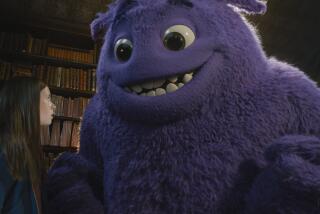
Review: ‘IF,’ a movie about imaginary friends, requires suspension of disbelief — and a few more drafts
May 17, 2024

‘My Octopus Teacher’ star takes a cold plunge to reconnect with nature in ‘Amphibious Soul’
May 11, 2024
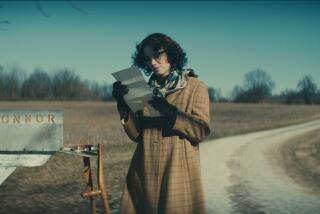
Review: In ‘Wildcat,’ director Ethan Hawke — and daughter Maya — bring a literary life to screen
May 3, 2024
Only good movies
Get the Indie Focus newsletter, Mark Olsen's weekly guide to the world of cinema.
You may occasionally receive promotional content from the Los Angeles Times.

Kenneth Turan is the former film critic for the Los Angeles Times.
More From the Los Angeles Times
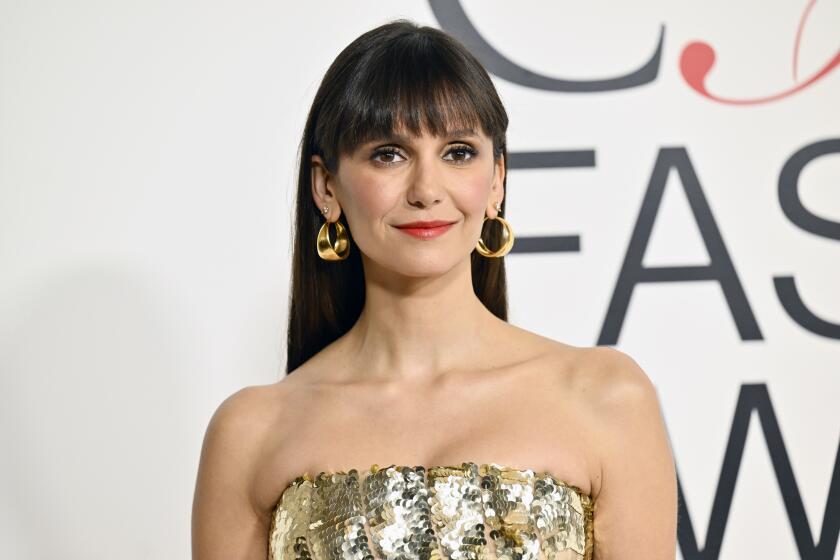
Entertainment & Arts
Nina Dobrev hospitalized after e-bike accident; says a ‘long road of recovery’ awaits
May 21, 2024
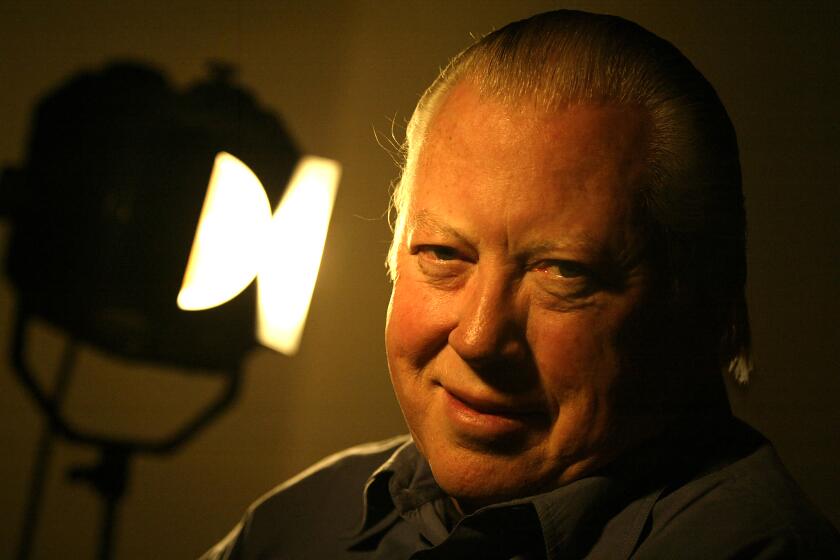
Fred Roos, ‘Godfather Part II’ producer and longtime Coppola collaborator, dies at 89
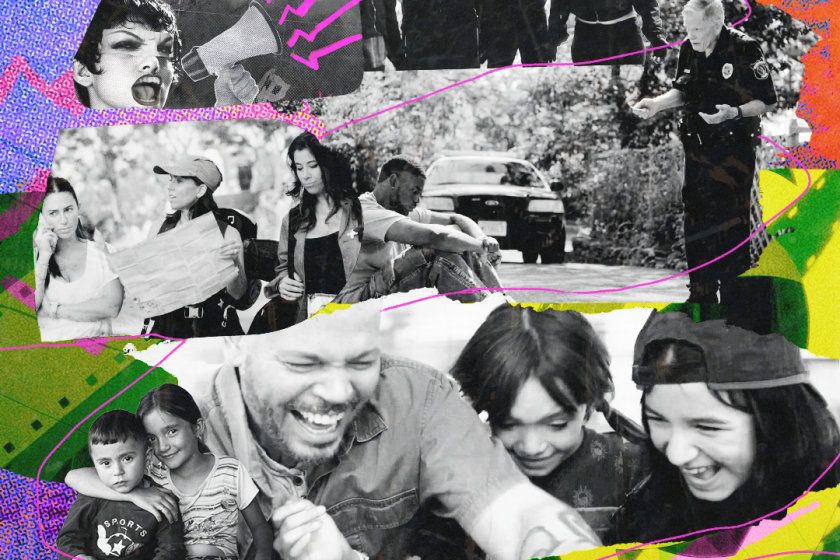
This year’s Los Angeles Latino International Film Festival to feature women-led movies, a film market
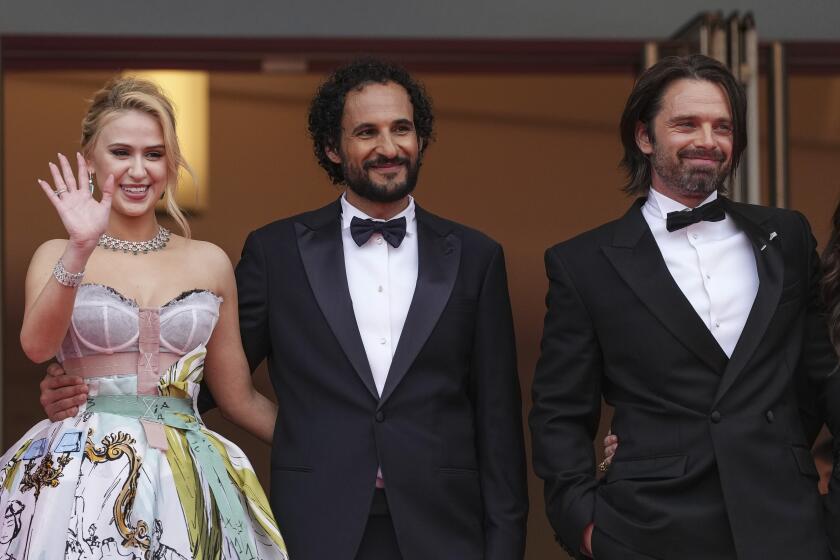
‘The Apprentice’ team fires back after Trump campaign threatens lawsuit
GUEST ESSAY: Exploring the wonders of the movie 'Wonder'

I recently viewed the movie (2017) “Wonder” when it was shown on the Disney Channel. It is a wonderful movie about the true meaning of friendships, about the tragedy of childhood and adolescent bullying, about the rewards of judging people by their inner qualities rather than by their physical appearances, about the healing powers of forgiveness and redemption. It is a movie that should be viewed and discussed with youngsters at schools, at homes, and at places of worship. While “Wonder” is not a true story the film reveals some important truths. It is based on the 2012 novel of the same title as the movie, authored by R.J. Palacio, who was inspired to write “Wonder” when she witnessed her 3-year-old son crying after he saw a child with facial deformities.
The movie’s plot centers around Auggie Pullman (Jacob Tremblay), who has a rare medical facial deformity, associated with Treacher Collins Syndrome. Auggie’s facial bones are underdeveloped, his ears are deformed, and he has undergone 27 different surgeries in order to hear, see, smell and speak.
After several years of homeschooling, Auggie’s parents, Nate and Isabel Pullman (played by Owen Wilson and Julia Roberts), enroll Auggie in a fifth-grade class at an elementary school.
Initially, Auggie is ostracized and ridiculed by other children but he does become friends with Jack, a popular student and athlete. For Halloween, Auggie attends school in a costume. When he enters his class unrecognized, Auggie overhears Jack (Noah Jupe) join four other children who are ridiculing Auggie. Auggie hears his supposed best friend say he would commit suicide if he had a face like Auggie’s face.
In the movie, Auggie’s older sister Via (Izabela Vidovic) has also been hurt because her best friend Miranda has stopped being a friend. Miranda prefers to hang out with the more popular girls.
I don’t want to give away too much of what happens in the movie, but I will reveal that Jack will regret the hurt he caused Auggie, while Miranda will likewise feel badly about her loss of friendship with Via. Jack and Miranda want to make amends and the way they do this will tug at your heartstrings. So will the love and devotion that characterizes the inter-relationships in the Pullman family — that includes their beloved dog Daisy —and the devotion of Mr. Tushman, the school’s principal (Mandy Patinkin) and the teachers, especially the English teacher Mr. Browne (Daveed Diggs), to the well-being of all their students and to the school’s zero-tolerance policy regarding bullying. The way the movie ends is unforgettable.
Mr. Browne advises the children to “be kind, for everyone is fighting a hard battle. And if you really want to see what people are, all you have to do is look” at their character traits rather than their physical features. This is a lesson that needs to be taught by parents at home as well as at all schools. Another important lesson conveyed in the movie: A measure of individual greatness is the ability and willingness of a person to bring out the best in others by the strength of one’s own decency and kindness. Auggie learns he can’t change his facial features, but he can – and he does – change the way others see him.
Jack initially became Auggie’s friend “only because my mom asked me to be nice to him.” But as Jack comes to the realization that Auggie “is smart, he’s actually very funny, he’s really a good person,” Jack will go to great lengths to re-establish Auggie’s trust and friendship. As for Miranda, she, too, will grasp the fact that Via “was a real friend and real friends are hard to find.”
Auggie’s mother assures Auggie, “You are not ugly and anyone who cares to know you will know that.” The truth of his mother’s words becomes apparent to Auggie as his status from being the least popular student in the school gradually changes to becoming the most popular student in the school.
This change in his popularity status is, in my opinion, less important than the changes in Auggie’s self-perception. Because each of us lives with ourselves all the time, self-friendship and self-respect matter more than the friendship and respect we receive from others. When Auggie learns to respect himself as the decent, worthwhile person he is, that is when his transformative experiences will have the most profound and positive impact on his overall life journey.
And that is why the movie “Wonder” is much more than a movie for young people. It is a movie for all of us, a movie that provides good insights into some of the best ways to have a meaningful life – in which we strive to respect ourselves and to respect other people, and other sentient beings – which is made apparent by the importance of Daisy, the Pullman family’s dog, in the film.
“Wonder” will be televised at 8 p.m. Saturday, Dec. 5, on TBS.
Joel Freedman, of Canandaigua, is a frequent Messenger Post contributor.
Wonder Is a 'Feel-Good' Movie That Needed More Realism
The film adaptation of R.J. Palacio’s bestselling novel downplays some painful truths about what it’s like to live with disfigurement.

Since its premiere last month, Wonder has been touted as a “feel-good,” family-friendly movie for the holiday season. The film is based on the 2012 bestselling novel by R.J. Palacio and follows a boy who was born with a craniofacial condition known as Treacher Collins syndrome , which causes disfigurement. Ten-year-old Auggie Pullman (Jacob Tremblay) has had to undergo nearly 30 surgeries, and his mother (Julia Roberts) gave up working on her Ph.D. to care for him. Wonder begins with Auggie facing a new sort of challenge: entering fifth grade at a mainstream prep academy after being homeschooled his whole life.
Wonder , both the book and the film, has received praise for being a nuanced tear-jerker about a difficult subject . The story’s emphasis on the value of empathy has resonated with many educators, parents, and children, while the struggles of its main character have spurred a greater awareness of craniofacial conditions, which affect the formation of the skull and face. After the novel was published, the Children’s Craniofacial Association ordered thousands of special-edition copies with its own logo to use as teaching tools. Wonder is, in short, one of the most popular modern stories about what it’s like to live with a facial difference. And yet, in many ways, it isn’t really about disfigurement, or even primarily about Auggie himself.
Told from several different perspectives, Wonder is broadly about human connection and the idea that everyone is extraordinary in their own way. As a result, the new adaptation (and to a lesser extent the novel) speaks less to people living with disfigurement and more directly to those affected by its aftermath—the family and friends of individuals with craniofacial conditions—and to the general public. Wonder is, to be sure, a well-crafted, well-intentioned movie. But it also downplays some important economic, emotional, medical, and psychological realities of living with a facial difference. In neglecting key opportunities to build on its source material, Wonder missed a chance to better represent the experiences of children like Auggie who are already so widely misunderstood.
To stay true to the alternating narration style Palacio used in the book, the film’s director Stephen Chbosky divided Wonder into chapters, each told from the point of view of a different character. The earliest scenes show Auggie’s perspective, revealing what it’s like to live with a disfigured face in a society where physical appearance so often determines a person’s worth. Chbosky makes clear that Auggie is a lot like other little boys: He loves his family, which consists of his sister Via and their two parents. He likes Star Wars and learning about space. Only his face sets him apart. Auggie learns at a young age to rely on his charm and self-deprecating humor to cope with bullying from other children. A talented performer, Tremblay easily communicates a particular kind of self-awareness that can develop in response to social ostracism.
Recommended Reading

The Company Working to Make Dance More Inclusive

The Problem With ‘Hey Guys’

How Pink Salt Took Over Millennial Kitchens
Like Auggie, I’m living with a facial difference due to a craniofacial condition that required dozens of surgeries. When I saw Wonder , a number of choices stood out to me as unintentionally ignorant or insensitive, but one of the first things that surprised me was how the film chose to portray the Pullmans as a wealthy family. The novel doesn’t exactly delve into the financial considerations that can come with having a child with a facial difference. Yet the adaptation seems disingenuously detached from economic reality, offering an almost Hallmark movie–esque depiction of Auggie’s home life. Viewers aren’t encouraged to think about the enormous toll that paying for 27 surgeries might have taken on the Pullmans, who live in a Brooklyn brownstone and can send two children to private school on a single-parent income. Of course, not all films need to dig into their characters’ money situation. But a movie centered on a family navigating the difficulties of Treacher Collins shouldn’t distort such an essential part of that experience. (Though the syndrome isn’t outright named in the book or the movie, Palacio has specified in interviews that Auggie has that particular condition.)
After my twin sister and I were born with Crouzon syndrome, which resulted in the premature fusion of bones in our skull, a local newspaper ran an article calling us “The Million-Dollar Twins,” because of how expensive our medical procedures were. My mother still laughs at the headline, because our hospital bills far exceeded $1 million. Like Auggie, I grew up in an upper-middle-class family and had the privilege of being treated by top surgeons at top hospitals. But both of my parents worked full-time (and sometimes more than one job) to cover the costs, so homeschooling was never an option. Wonder ’s rosy approach to the Pullmans’ financial circumstances obscures the hardships faced by many parents of children with facial differences.
The adaptation also skews reality—and, in this case, the source material—by making Auggie’s appearance far less extreme. In the novel, Palacio gave page-long descriptions of the boy’s face, detailing the at-times-gruesome truth about living with a craniofacial condition. “Sometimes people assume he’s been burned in a fire: His features look like they’ve been melted, like the drippings on the side of a candle,” Palacio writes. Auggie’s eyes, readers are told, are halfway down his face and sag and slant downwards. He doesn’t have eyebrows, eyelashes, or cheekbones. (If you look up images of Tremblay’s Auggie and images of children with Treacher Collins, you can see how stark the difference is.)
The film’s producers likely had their reasons for giving Auggie only a slight disfigurement, maybe to avoid being seen as exploiting his looks or to make the movie as broadly appealing as possible. But it’s one thing to read about severe disfigurement and the social trauma that can accompany it in a book, and another entirely to see it play out on screen, where viewers might be forced more viscerally to confront their own prejudices. The adaptation , instead, goes a gentler route: The prosthetics that Tremblay wears make Auggie difficult to look at, but not too difficult, allowing viewers to be more receptive to the film’s message of accepting those who look different—though not too different.
Critiques of how Wonder handled Auggie’s looks and the Pullmans’ wealth have been largely absent from the many positive reviews the film has earned. In fact, many reviews have used language considered derogatory within the facial-difference community, highlighting the relative invisibility of people with craniofacial conditions within the media (one piece referred to Auggie as a “ deformed little kid ”). It’s little surprise then that one of the movie’s most highly praised features happens to be, in my view, one of its biggest weaknesses: the multiple-perspective storytelling.
In addition to Auggie, Wonder looks through the eyes of his sister Via, Auggie’s friend Jack, and Via’s best friend Miranda. In doing so, the film takes a multifaceted approach to everyone except, somehow, Auggie himself. Via’s chapter digs deep into her love for her brother and her envy of the attention he receives. “Auggie is like the sun; the world revolves around him,” she says in a voiceover. Via’s story centers on her resentment about always coming second to Auggie at home because of his medical problems. But Wonder explores the many other parts of her life, too, including her relationship with Miranda, her crush on a classmate, and her plans to audition for the school play.
Wonder could have been a better adaptation if it had afforded Auggie the same interior complexity it gives to Via and the other narrators. To its credit, the movie includes fewer perspectives than the novel does, granting Auggie more room in the film. Still, he functions mostly as the thread that ties all the characters together, and his main mission is adjusting to a society that treats him like an outcast. He’s quiet, likable, and slow to anger. “Dude, this is after plastic surgery. It takes a lot of work to look this good,” Auggie says when Jack asks if he’s considered getting reconstructive work done. But this question isn’t even treated as insulting because Auggie’s entire identity comes back to what he looks like.
It would have been powerful to see Auggie accept his own face, while still wishing to be accepted by others. Instead, he spends much of the first half of the film wearing an astronaut helmet out of shame, an image that dominates Wonder ’s promotional material. Eventually, Auggie’s father (Owen Wilson) hides the headgear. “I want to see my son’s face,” he tells Auggie. Of course, many people with craniofacial conditions have a hard time coming to terms with their appearance. But given how few films exist about people with facial differences, scenes like this can leave the false impression that deep insecurity is the default for children like Auggie, when that isn’t always the case. In a story published by The Washington Post , Teresa Joy Dyson, 10, offered her thoughts on the movie: “I didn’t like that Auggie was ashamed of his face. I have Treacher Collins syndrome and I’m kind of proud of my face. I’m not afraid to look at people and show who I am,” she said.
Some of Wonder ’s representation problems echo the issues that can arise when Hollywood makes stories about marginalized groups. The existing lack of pop-cultural visibility for people with facial differences (roughly 600,000 people have been diagnosed with a craniofacial condition in the U.S.) is amplified by Hollywood’s emphasis on conventional attractiveness in performers. It’s unfortunate that Wonder —a film about how there’s no shame in being who you are, no matter what you look like—ended up casting a child without a facial difference as Auggie, and fitting him with elaborate prosthetics to re-create his disfigurement. It was hard for me to watch the movie and not feel like Wonder had validated Auggie’s desire to hide himself away out of embarrassment, despite producers’ efforts to cast a child with a craniofacial condition.
“I was pushing hard to cast a boy with Treacher Collins,” Palacio said in an interview with The Sun . “But finding one the right age, who had the right facial differences, whose parents would let him miss school for months of shooting, leaves a very small pool of people.” Palacio’s explanation nonetheless glosses over the fact that her novel never specified which condition Auggie had, which could have allowed producers to expand their search. The author shared that one boy with a facial difference came close to nabbing the lead role:
Acting can be tough. You have to read the lines 30 different times, in different ways, with 100 people watching you, opposite Julia Roberts. Nathaniel had physical limitations, he was hard to understand sometimes, and if you have a $20 million movie you have to make that call. The family did become consultants on the movie, though, and during filming his dad said to me, “Thank God they didn’t cast Nathaniel. It would have been too much.”
Tremblay did a skilled job of bringing Auggie to life. But his casting means that a nondisfigured writer (Palacio) and a nondisfigured actor (Tremblay), who have no personal experience with craniofacial conditions, have now seemingly become the face and voice of an entire community. (For her part, Palacio was inspired to write Wonder after her 3-year-old son started crying at the sight of a young girl with a facial difference.) Investing in authentic casting, despite the difficulties of the search, would have allowed the film’s creators to really stand by their message of inclusion and acceptance.
Wonder has many merits—an interesting story, solid acting, and lots of emotion—but it crucially fails to move past a sentimental representation of individuals with facial differences. The film, like the novel, struggles with making Auggie more than a prop; his very existence is meant to be inspiring to other characters and to viewers. The complex backstories of Miranda, Via, and Jack did a better job of illustrating that empathy is important because you never know what another person might be going through. But Auggie is often reduced to his disfigurement and to his suffering at the hands of bullies. In school, he gets compared to Freddy Krueger, receives mean notes on his desk and in his locker, and is the butt of jokes about how the world would be better off if he were dead.
Even more frustrating is that, both in the book and in the movie, Auggie almost never fights back against the ignorance he’s forced to encounter. It’s his ability to stay kind to his classmates despite their abuse that ultimately helps him win an award at the end-of-year assembly. The core message of Wonder is, after all, “When given the choice between being right or being kind, choose kind.” But this is a particularly fraught suggestion for individuals living with disfigurement. While kindness is always a great option (and a virtue the other characters benefit from), this lesson requires Auggie to tolerate those who won’t tolerate him, and to educate a society whose impulse is to be cruel. For all Wonder ’s feel-good appeal, it would be misguided to praise it as a story created for people like Auggie and myself. Instead, it was made for those who need help understanding that people with physical differences are just like everyone else—something that those of us living with disfigurement have known all along.

- May 21 The Unaccompanied Minors will perform in the amphitheater during lunch Wednesday, May 22.
- May 21 The yearbook distribution will take place for sixth through eleventh grade Wednesday, May 22 in the courtyard.
- May 21 Subscribe to our weekly newsletter by clicking here.

ARTS & ENTERTAINMENT
Review: “Wonder” dazzles children, adults with message of empathy and acceptance
By Rio Hundley , Features Editor | December 9, 2017
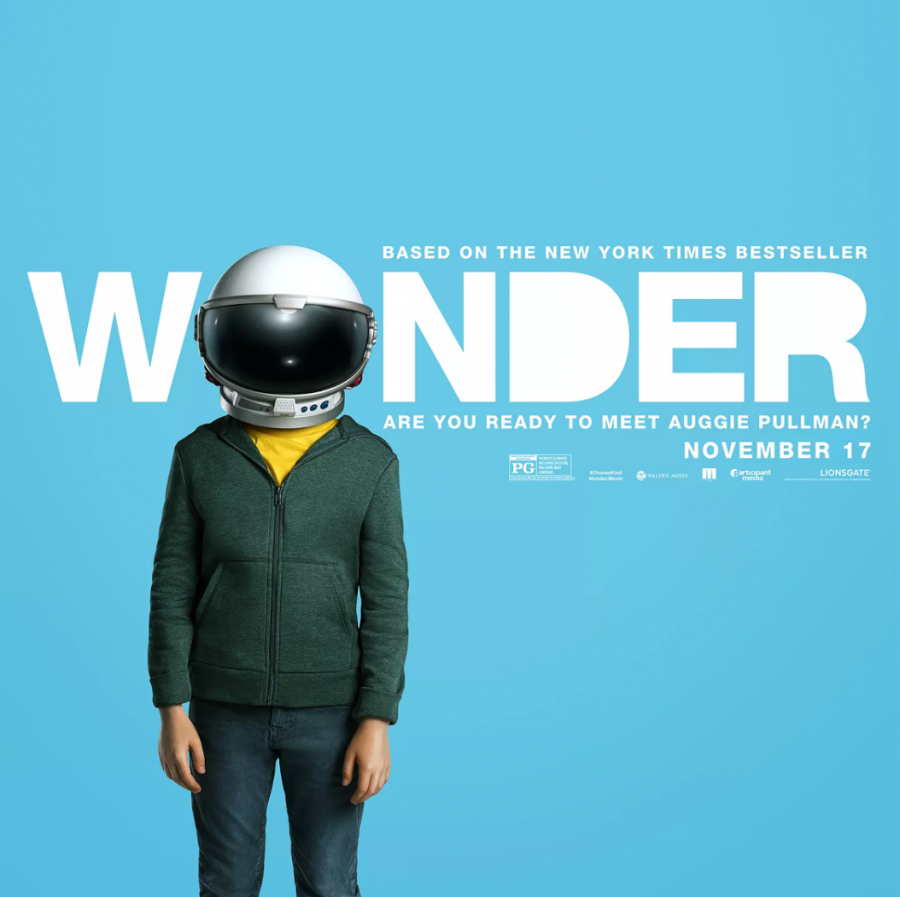
Wonder’s promotional poster. Wonder was released Nov. 17 and is now screening everywhere. Image source: Wonder Movie .
It is refreshing to find a film that simply asks its audience to “choose kind.”
I became familiar with this phrase when reading the R.J. Palacio ’s bestselling novel “Wonder.” The recent movie, “Wonder,” based on the book by the same name, tells the story of 10-year-old Auggie ( Jacob Tremblay ), a boy with facial deformities. Homeschooled up until the fourth grade, Auggie is well aware of the challenges that await him when he enrolls in middle school. But Auggie is not defined by his appearance; his intelligence and kind nature are the qualities that he longs for his peers to see.
“Wonder” also includes the narratives of other figures in Auggie’s life. Although all of the narratives are poignant and engaging, a highlight is the coming of age of Auggie’s sister, Via ( Izabela Vidovic ), as well as the journey of Auggie’s friend and classmate, Jack Will ( Noah Jupe ). However, Auggie’s bright and compassionate mother ( Julia Roberts ) and humorous but genuine dad ( Owen Wilson ) should not be overlooked.
The vibrant and well-drawn characters are cast and portrayed perfectly. They accentuate the engaging and well-paced story. Tremblay’s Auggie is relatable, inspires empathy and handles his situation in a light-hearted but equally touching way. Auggie’s family is realistic and supportive; they are always there for Auggie, despite having their own personal struggles. All of Auggie’s classmates also play their roles to perfection, and the audience comes to understand and have sympathy for all of them — even Auggie’s primary tormentor, Julian. Mandy Patinkin and Daveed Diggs shine in their supporting roles as Auggie’s principal and teacher, respectively, but they don’t upstage the main characters.
Recent Reviews

Review: Smorgasburg LA highlights diverse cultures, worth the Sunday trip Downtown
“Wonder” is rare in it’s appeal to both children and adults. Movies can lose kids’ interest with slower pacing and a complicated plot, or they can bore adults with a superficial and hastily constructed story. “Wonder” does neither of these things. The movie gives kids characters to which they can relate and a plot they can follow. But it also gives adults a deep story with insight into the lives of children. The story is beautifully simple, and the themes are universal, yet complex.
In many ways, “Wonder” has found the perfect medium between humor and drama, as well as simplicity and substance. The film is uplifting, but not preachy. It is hopeful, but also realistic. And as someone who greatly enjoyed Palacio’s novel, the movie did not disappoint.
“Wonder” is rated PG for thematic elements including bullying, and some mild language. It is currently playing in theaters, including Cinemark, Arclight and AMC.
- Technical Quality
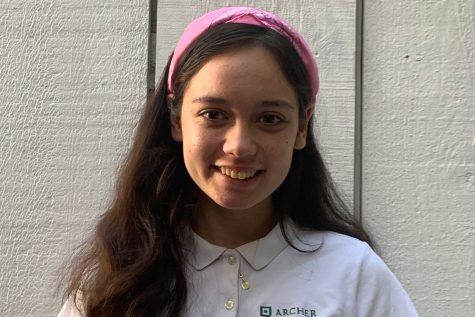
Rio Hundley was involved in the Oracle from 2017-2021. She graduated in 2021. She was promoted to Sports Editor in 2019 and became Features Editor in 2020....

The power of a voice: Maya Acutt’s journey with a cappella
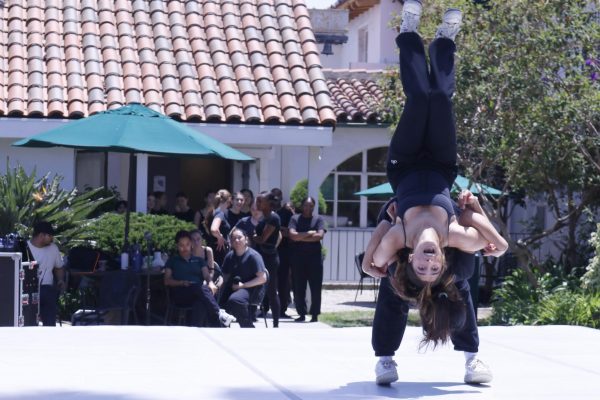
‘It’s for anybody who wants to dance’: Festival of Dance showcases student-choreographed dances
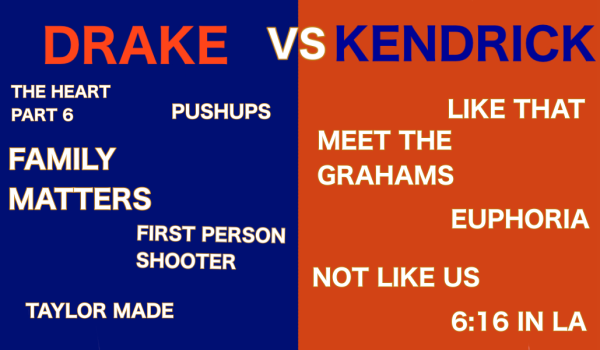
Opinion: Unpacking the greatest week in Hip Hop: Drake vs. Kendrick Lamar
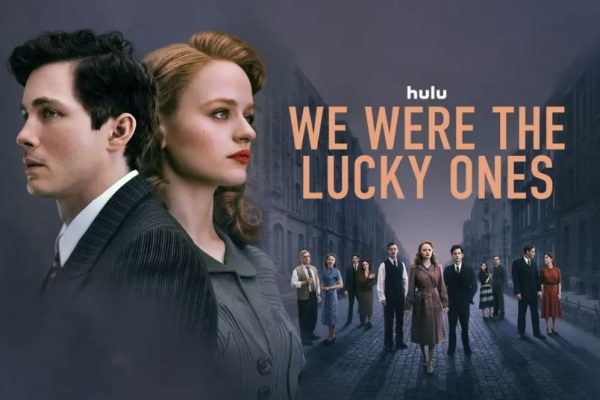
Review: Love, hope, connecting to my Jewish culture through “We Were the Lucky Ones”
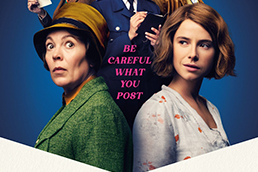
Review: ‘Wicked Little Letters’ keeps audience on the edge of their seat with unique message
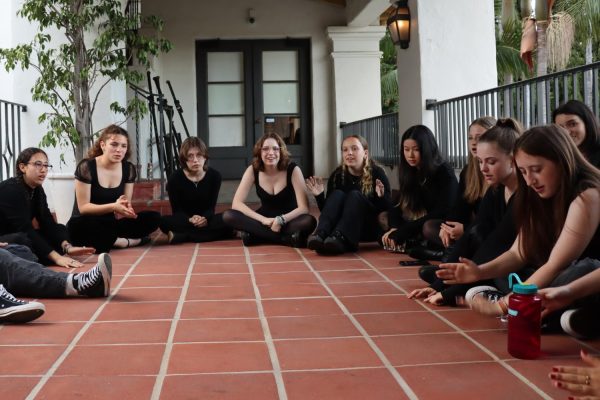
Photo essay: Behind the scenes of the spring concert
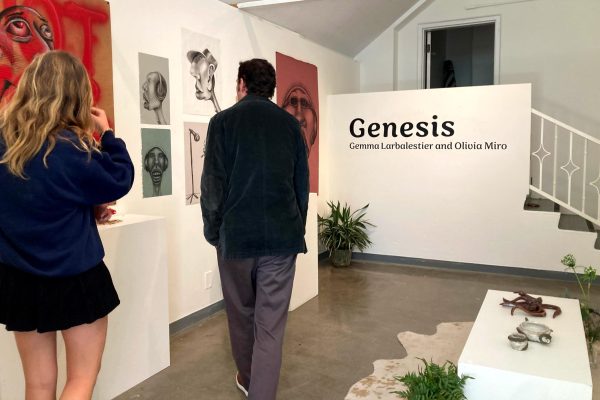
‘Genesis’ senior show connects music, nature to the human experience
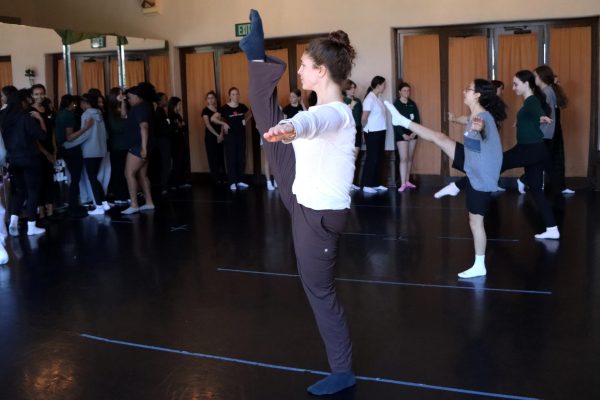
Tempos and tryouts: Dance company auditions foster ‘supportive’ atmosphere across grade levels
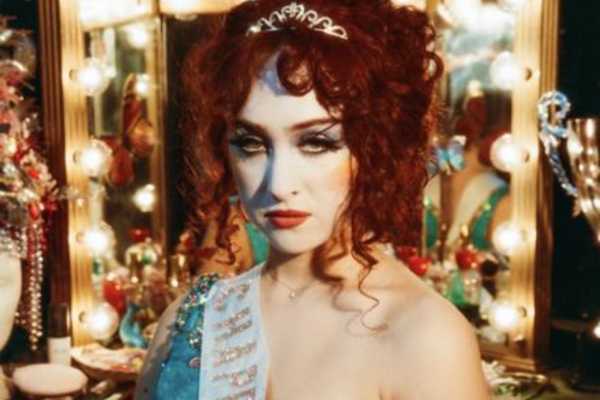
Review: Chappell Roan’s ‘The Rise and Fall of a Midwest Princess’ is an instant queer pop classic

Review: Kacey Musgraves heals, embraces peace on ‘Deeper Well’
The student news site of The Archer School for Girls
- Letters to the Editor
Comments (0)
Cancel reply
Your email address will not be published. Required fields are marked *
- Andhra Pradesh
- Arunachal Pradesh
- Chhatisgarh
- Himachal Pradesh
- Jammu and Kashmir
- Madhya Pradesh
- Maharashtra
- Uttar Pradesh
- Uttarakhand
- West Bengal
- Movie Reviews
- DC Comments
- Sunday Chronicle
- Hyderabad Chronicle
- Editor Pick
- Special Story
Wonder movie review: A wholesome film with timely, powerful messages

Director: Stephen Chbosky
Cast: Julia Roberts, Owen Wilson, Jacob Tremblay, Mandy Patinkin, Daveed Diggs and others.
Director Chbosky previously gave us the gem 'The Perks of Being a Wallflower', and this time out he allows us to explore the fragility of friendship and family, and the importance of toughness in an individual. The movie ‘Wonder’ has strong messages about kindness, love, appreciating everyone for who they are and true friendship.
'Wonder' tells a story of a boy named August/ 'Auggie' (Jacob Tremblay), who was born with Treacher Collins syndrome; he has gone through 27 surgeries since birth. After years of home-schooling, Auggie is sent to a regular school by his Mom (Julia Roberts), against Auggie's Dad's (Owen Wilson) wishes. Auggie faces all types of problems that an individual experiences among a group of similar-looking people - being stared/frowned at, being accepted with doubts and suspicions, and also being bullied. However, Auggie is a tough-minded and intelligent person, and finally manages to gain genuine acceptance by most of his schoolmates and other people in the community.
Writer and Director Stephen Chbosky's 'Wonder' is a wonder. His screenplay along with Steve Conrad and Jacob Thorne, based on the book by RJ Palacio is bold and fearlessly compassionate. Instead of maudlin sentimentality, Chbosky brazenly challenges our prejudice of appearances. In one beautiful scene, Auggie, so weary of the frightened looks of others, cries asking his Mom, "Why am I so ugly?"
Multiple character viewpoints of Auggie's classmate and friend Jack, his loving sister Via (Olivia), Via's distant best friend Miranda tells Auggie's story which gives 'Wonder' a level of originality and earnestness. This really helps the viewer connect with the film and makes it work as an engrossing and heartwarming picture. With each viewpoint, every moment of emotion fits like a puzzle and that convincingly flows in every scene.
The actors have done a fantastic job, Jacob Tremblay ('Room', 'The Book of Henry') proves again his talent as an actor. You won't recognize him because of the makeup but his expressions, voice and eyes are really persuasive. All the kids are amazing. Izabela Vidovic as Auggie's sister is especially very good. She beautifully portrays her suffering in the shadows while all the love is shined upon Auggie. Julia Roberts is excellent as Auggie's strong, determined mother and Owen Wilson, although decent, has a limited screen presence. Also, it was bit awkward to see him playing Robert's husband.
'Wonder' would have been an exceptional experience if it had avoided the usual crowd-pleasing cheesiness in the climax. There is also a brief scene about the family dog being put down which has no real connection to the content of the movie. The silly fight between the kids near the end felt out of place and unnecessary. Nevetheless, one could easily overlook these minor hiccups while being on the journey with the very likable characters.
'Wonder' is a simple, heartwarming and overall winsome drama with a lot of heart. It rightly delivers the message of kindness, forgiveness and the importance of self-love, which makes it a wholesome family entertainer.

Latest News

Common Sense Media
Movie & TV reviews for parents
- For Parents
- For Educators
- Our Work and Impact
Or browse by category:
- Get the app
- Movie Reviews
- Best Movie Lists
- Best Movies on Netflix, Disney+, and More
Common Sense Selections for Movies

50 Modern Movies All Kids Should Watch Before They're 12

- Best TV Lists
- Best TV Shows on Netflix, Disney+, and More
- Common Sense Selections for TV
- Video Reviews of TV Shows

Best Kids' Shows on Disney+

Best Kids' TV Shows on Netflix
- Book Reviews
- Best Book Lists
- Common Sense Selections for Books

8 Tips for Getting Kids Hooked on Books

50 Books All Kids Should Read Before They're 12
- Game Reviews
- Best Game Lists
Common Sense Selections for Games
- Video Reviews of Games

Nintendo Switch Games for Family Fun

- Podcast Reviews
- Best Podcast Lists
Common Sense Selections for Podcasts

Parents' Guide to Podcasts

- App Reviews
- Best App Lists

Social Networking for Teens

Gun-Free Action Game Apps

Reviews for AI Apps and Tools
- YouTube Channel Reviews
- YouTube Kids Channels by Topic

Parents' Ultimate Guide to YouTube Kids

YouTube Kids Channels for Gamers
- Preschoolers (2-4)
- Little Kids (5-7)
- Big Kids (8-9)
- Pre-Teens (10-12)
- Teens (13+)
- Screen Time
- Social Media
- Online Safety
- Identity and Community

Real-Life Heroes on YouTube for Tweens and Teens
- Family Tech Planners
- Digital Skills
- All Articles
- Latino Culture
- Black Voices
- Asian Stories
- Native Narratives
- LGBTQ+ Pride
- Best of Diverse Representation List

Celebrating Black History Month


Movies and TV Shows with Arab Leads

Celebrate Hip-Hop's 50th Anniversary
Common sense media reviewers.

Earnest, emotional book adaptation has strong messages.

A Lot or a Little?
What you will—and won't—find in this movie.
No one is ordinary. Who we are on the inside matte
Characters in general are well-intentioned and car
The film centers around a boy with a facial differ
Tween boys get in a fight at school, punching each
Teens kiss. An adult married couple kisses; it's i
Infrequent use of words including "shut up," "oh m
Characters play/interact within Minecraft and talk
A woman going through a hard divorce drinks a lot
Parents need to know that Wonder is an earnest, emotional family drama based on R.J. Palacio's award-winning novel of the same name. It centers on Auggie Pullman (Jacob Tremblay), a young boy with a genetic facial difference. Auggie meets both cruel bullies and good friends as he attends school for the first…
Positive Messages
No one is ordinary. Who we are on the inside matters more than what we look like on the outside. True friends appreciate you for you who are, not what you look like or the things you have. True friends also stick up for you and empathize with you. It's more important to do what's right than what's popular, but it's also hard to be different sometimes. Everyone has their own issues and problems; just because things look OK on the surface doesn't mean they're not hurting/vulnerable. We can't change how people look, so maybe we can change the way we see. Choose kindness. Aspire to be great. Themes also include empathy and compassion.
Positive Role Models
Characters in general are well-intentioned and caring, even if they're not perfect. Auggie is brave and stoic in the face of huge challenges; he perseveres even when it's really hard. But he also helps a classmate cheat and doesn't get caught. Jack Will makes big mistakes but learns from them and apologizes. Via struggles to be seen but learns to speak up for herself. Auggie's parents try their hardest to support him, sometimes by letting him take risks and get hurt. Mr. Tushman and Mr. Browne are caring, thoughtful teachers/administrators. Julian bullies Auggie, but even he learns a few things.
Diverse Representations
The film centers around a boy with a facial difference/disfigurement and sympathetically portrays his challenges and successes. But positive representation is reduced by the fact that Auggie is played by Tremblay, a non-disabled actor who wore prosthetics/makeup for the part, continuing the industry-wide inequality against hiring actors with facial differences -- even for roles that are explicitly about them. Most of the main characters are White and apparently quite well-off financially, though there's mention of a student on scholarship, and there are a few supporting characters of color. Women such as Auggie's mom and sister have positive roles, plus their own respective story arcs.
Did we miss something on diversity? Suggest an update.
Violence & Scariness
Tween boys get in a fight at school, punching each other and rolling on the ground. A group of tween boys also gets in a fight with a group of older kids; the scuffle is brief but intense. Auggie is frequently bullied by cruel/insensitive classmates, usually verbally or via pictures, though he's sometimes also intimidated physically. One character says he'd kill himself if he looked like Auggie. Spoiler alert : A family pet dies, leading to sadness/tears.
Did you know you can flag iffy content? Adjust limits for Violence & Scariness in your kid's entertainment guide.
Sex, Romance & Nudity
Teens kiss. An adult married couple kisses; it's implied that one gave the other a risque gift (not shown or specified). Mild innuendo.
Did you know you can flag iffy content? Adjust limits for Sex, Romance & Nudity in your kid's entertainment guide.
Infrequent use of words including "shut up," "oh my God," "jerk," "freak," "sucks," "hate," "crappiest," "deformed," "stupid," "junk," "farted." Auggie is called names, including "Darth Hideous" and "Gollum." Jokes related to the principal's last name, Tushman, involve words like "tushie," "butt," "buttface." Burping.
Did you know you can flag iffy content? Adjust limits for Language in your kid's entertainment guide.
Products & Purchases
Characters play/interact within Minecraft and talk about it. Other brands/logos seen include Star Wars, NASA, Law & Order, Kinko's, Dirty Dancing , Poland Spring water, Ghostface (from Scream ), San Pellegrino, The Wizard of Oz .
Drinking, Drugs & Smoking
A woman going through a hard divorce drinks a lot of wine (and, it's implied, passes out); her teen daughter finishes one of her glasses. Adults drink wine with dinner; one says "Let's get drunk!" during a date-night dinner.
Did you know you can flag iffy content? Adjust limits for Drinking, Drugs & Smoking in your kid's entertainment guide.
Parents Need to Know
Parents need to know that Wonder is an earnest, emotional family drama based on R.J. Palacio's award-winning novel of the same name. It centers on Auggie Pullman ( Jacob Tremblay ), a young boy with a genetic facial difference. Auggie meets both cruel bullies and good friends as he attends school for the first time; his supportive family (including his parents, played by Julia Roberts and Owen Wilson ) is always there for him -- even when he tries to push them away. The movie has clear positive messages about choosing kindness, appreciating everyone for who they are (rather than what they look like), and true friendship; empathy, compassion, and perseverance are also strong themes. There's some fighting among tweens/young teens and sad moments involving a loss. Language includes name-calling and insult words like "shut up," "jerk," "freak," and "deformed," as well as an "oh my God" or two. Teens kiss, and adults flirt/exchange mild innuendo. A teen character finishes her mom's abandoned glass of wine after her mom, who's going through a difficult divorce, falls asleep/passes out. Though the film centers around a character living with a visible difference, positive representation is reduced by the fact that Auggie is played by a non-disabled actor who wore prosthetics/makeup for the role. Most of the main characters are White and apparently quite well-off financially, though there's mention of a student on scholarship, and there are a few supporting characters of color. To stay in the loop on more movies like this, you can sign up for weekly Family Movie Night emails .
Where to Watch
Videos and photos.

Community Reviews
- Parents say (77)
- Kids say (200)
Based on 77 parent reviews
Great messages throughout + unnecessary drunkenness
What's the story.
In WONDER, August "Auggie" Pullman ( Jacob Tremblay ) is about to start fifth grade -- marking his first time at a school with other kids, rather than learning at home from his mom, Isabel ( Julia Roberts ). That would be plenty nerve-wracking on its own, but Auggie has more to worry about than the average new middle schooler: Born with a genetic condition, he has a significant facial difference. Twenty-plus surgeries in his short life have left him able to hear, see, and speak like other kids, but he definitely doesn't look like them. And since he can't wear his beloved astronaut helmet all day at school, he has to face them all in person. It's far from easy: Kids call him names ("Darth Hideous," "Gollum") and bully him, and even his parents can't talk away the hurt. But Auggie isn't the only one facing challenges. His older sister, Via ( Izabela Vidovic ), feels like their parents (Isabel and Nate, played by Owen Wilson ) barely pay attention to her because Auggie needs so much from them. Auggie's new friend, Jack Will (Noah Jupe), genuinely likes Auggie but doesn't know how to speak up for him in school. Via's former best friend, Miranda (Danielle Rose Russell), seems tough on the outside but is grappling with difficult family issues. And even Julian (Bryce Gheisar), who bullies other kids, has his own problems. As Auggie navigates his first year of school, he -- and all the people around him -- learn to think more of others and find happiness inside themselves.
Is It Any Good?
Based on R.J. Palacio's hugely popular, award-winning novel , this drama is earnest and sweet, with great messages about kindness, friendship, and acceptance for its tween target audience. Whether they've read the book or not, kids are sure to appreciate Wonder 's take on how hard it can be to fit in and feel good about yourself, no matter what you look like. By mirroring the book's structure and giving viewers first-person glimpses of how the world looks to characters other than Auggie (Via, Miranda, and Jack Will all get their moments), director Stephen Chbosky helps build empathy, which is an invaluable skill for viewers of all ages. That said, the perspective-switching isn't consistent enough for it to totally work as a storytelling device in the film; plot details are brought up and then not really given closure, and the choice of why some characters get to tell their own stories while others don't isn't really clear.
But thanks to an emotionally resonant script and strong performances by the cast, quibbles like that can be mostly ignored. Roberts and Wilson are well-matched as Auggie and Via's parents, Tremblay emotes well even under heavy prosthetics and makeup, and Vidovic pulls off the challenge of playing a moody teen without making you roll your eyes at her. In the supporting cast, Hamilton 's Daveed Diggs is engaging as Auggie's believably inspiring teacher, Mr. Browne; Mandy Patinkin is all grandfatherly charm as school director Mr. Tushman; and Jupe is excellent as Auggie's friend Jack Will. A scene in which he reacts to the aftermath of a hallway fight is an astounding bit of child acting. In the end, while it's not hard to see where Wonder is going, getting there is a valuable journey, especially for kids.
Talk to Your Kids About ...
Families can talk about how the other kids react to Auggie in Wonder . What do they learn about him over the course of the movie? What do you think you'd do in their position?
How does being bullied affect Auggie? How did you feel about Julian by the time the movie was over? What role does peer pressure play in some of the bullying? How would you handle the situation that Jack Will faces?
How does the story show the importance of empathy and perseverance ? Why are those important character strengths ?
If you've read the book , how do you think the movie compares? Which parts were the same? Which were different?
How do you think this story might be different if the characters weren't, in general, so privileged? What advantages does Auggie have based on his background? Is it OK that he's portrayed by an actor who doesn't have a facial difference in real life?
Movie Details
- In theaters : November 17, 2017
- On DVD or streaming : February 13, 2018
- Cast : Julia Roberts , Owen Wilson , Jacob Tremblay
- Director : Stephen Chbosky
- Inclusion Information : Female actors
- Studio : Lionsgate
- Genre : Family and Kids
- Topics : Book Characters , Friendship , Great Boy Role Models
- Character Strengths : Compassion , Empathy , Perseverance
- Run time : 113 minutes
- MPAA rating : PG
- MPAA explanation : thematic elements including bullying, and some mild language
- Award : Common Sense Selection
- Last updated : April 19, 2024
Did we miss something on diversity?
Research shows a connection between kids' healthy self-esteem and positive portrayals in media. That's why we've added a new "Diverse Representations" section to our reviews that will be rolling out on an ongoing basis. You can help us help kids by suggesting a diversity update.
Suggest an Update
Our editors recommend.

Diary of a Wimpy Kid

Alexander and the Terrible, Horrible, No Good, Very Bad Day

Phantom Boy

We're All Wonders

White Bird: A Wonder Story
Movies based on books, movies with characters who have physical disabilities, related topics.
- Perseverance
- Book Characters
- Great Boy Role Models
Want suggestions based on your streaming services? Get personalized recommendations
Common Sense Media's unbiased ratings are created by expert reviewers and aren't influenced by the product's creators or by any of our funders, affiliates, or partners.

The Movie "Wonder" Demonstrates the Power of Kindness
Here are five tips to teach your children to accept those who are different..
Posted December 11, 2017
By guest contributors Jonathan Emmons, Michelle Demaray, Christine Malecki, and Julia Ogg
Children who have disabilities inevitably encounter unique and difficult challenges while growing up, but bullying shouldn’t be one of them.

As a parent, you can do something about it by ensuring that you instill the quality of kindness in your own children.
Some disabilities might be visible, as highlighted in the new cinematic drama “Wonder.” It’s based on the New York Times bestseller by Raquel J. Palacio about the first mainstream school experience of Auggie, a fifth-grade boy with a craniofacial disorder. Craniofacial disorders may cause significant health problems for youth, but most noticeable to peers is the different facial appearance.
Disabilities that are visible in a person’s physical characteristics, or through their speech or behavior, can lead other students to bully them, as is the case with Auggie. Other disabilities are less visible, such as a learning disabilities or behavior disorders, but might still result in bullying. In fact, children with disabilities are bullied in schools and online about twice as often as children without disabilities (Rose, Simpson, & Moss, 2015).
Being a victim of bullying can have negative effects for students with disabilities. For Auggie and others, isolation may seem like the only way of escape. For example, Halloween was Auggie’s favorite holiday because he was able to dress up and hide his face. Studies also show that being bullied can lead to anxiety , depression , reduced self-esteem , and lower levels of engagement at school for children with disabilities (Rose, Monda-Amaya, & Espelage, 2011).
However, there are proven ways to prevent bullying and the associated negative outcomes. One method is by helping children develop the skills to support peers who may be perceived as different. This can encourage an overall environment where being kind is the norm.
Some tips for parents on how to develop these skills in children include the following.
1. Model kind behavior toward others who are different. This is the best way to teach your children how to treat others. Teach your child that we hold power in our words and are responsible for using them wisely. Choose your words carefully and be aware that some language related to disabilities might carry negative connotations and stigmas. For example, always assume children are listening if adults say things like “that’s retarded.” Avoid such language yourself, and correct it in your children if you hear it.
2. Find common ground. Just because we are different in some ways doesn’t mean we can’t be similar in other ways. Help your child find common ground and interests with those who have different abilities and skills.
3. Help children build empathy for others who are different. Building empathy means helping your child take another’s perspective—to “put themselves in someone else’s shoes.” Teaching empathy will make it more likely that your child will stick up for others when they see mean behavior. To encourage empathy, discuss the impact of your child’s behavior on others and practice perspective-taking . This may help children understand what it feels like to be mistreated.
4. Encourage open communication with your children. We can’t prepare our children for every possible situation, so make sure they are comfortable talking to you or another adult about what they see and hear at school and in other environments, and how to help those who are targeted. Parents can also use news stories or movies, such as “Wonder,” to spark discussions about how we should treat others who are different.
5. Keep the conversation going. To make a difference, we need to make ourselves and others aware of important resources. We encourage you to share these tips with others and explore ways to impact your community. Finding out information about local school-wide efforts to address bullying or discovering online resources for ideas on how to promote kindness can be a great place to start. Excellent online resources include Pacer’s National Bullying Prevention Center and the U.S Department of Health and Human Services' StopBullying.gov.
We all have a role to play in protecting and empowering others. Helping children understand, accept, and appreciate differences provides them with an important set of skills that will serve them well as adults.
Jonathan Emmons, M.A., is a first-year Ph.D. student at Northern Illinois University . His research interests include social and cognitive factors involved in learning, the role of social support resources in the academic environment, and promoting positive psychological outcomes for students.

Michelle Demaray, Christine Malecki, and Julia Ogg are faculty within the school psychology program at Northern Illinois University. They have been awarded a grant from the U.S. Department of Education for Project Prevent and Address Bullying , which focuses on strategies for addressing the bullying of youth with special needs.
Rose, C. A., Monda-Amaya, L. E. & Espelage, D. L. (2011). Bullying perpetration and victimization in special education: A review of the literature. Remedial and Special Education, 32, 114-130. doi:10.1177/0741932510361247
Rose, C. A., Simpson, C. G., & Moss, A. (2015). The bullying dynamic: Prevalence of involvement among a large-scale sample of middle and high school youth with and without disabilities. Psychology in the Schools, 52, 515-531. doi:10.1002/pits.21840

Angela Grippo, Ph.D. , is an Associate Professor of Psychology at Northern Illinois University.
- Find a Therapist
- Find a Treatment Center
- Find a Psychiatrist
- Find a Support Group
- Find Online Therapy
- United States
- Brooklyn, NY
- Chicago, IL
- Houston, TX
- Los Angeles, CA
- New York, NY
- Portland, OR
- San Diego, CA
- San Francisco, CA
- Seattle, WA
- Washington, DC
- Asperger's
- Bipolar Disorder
- Chronic Pain
- Eating Disorders
- Passive Aggression
- Personality
- Goal Setting
- Positive Psychology
- Stopping Smoking
- Low Sexual Desire
- Relationships
- Child Development
- Self Tests NEW
- Therapy Center
- Diagnosis Dictionary
- Types of Therapy

At any moment, someone’s aggravating behavior or our own bad luck can set us off on an emotional spiral that threatens to derail our entire day. Here’s how we can face our triggers with less reactivity so that we can get on with our lives.
- Emotional Intelligence
- Gaslighting
- Affective Forecasting
- Neuroscience
Movie Reviews
Tv/streaming, collections, great movies, chaz's journal, contributors.

Now streaming on:
“We are nothing without stories, and so we invite you to believe in this one.” Sebastian Lelio’s fascinating “The Wonder” opens with a prologue that includes this line, one that’s crucial to unpacking the film that follows. Working with co-writers Alice Birch & Emma Donoghue to adapt Donoghue’s novel, Lelio doesn’t just want you to passively watch the story of what’s to come. It’s not an invitation to hear or see this story, but to believe in this one. Lelio is less concerned about the practical truths and lies of “The Wonder” than he is about what they mean, what they say about humanity, and how they interrogate what we believe.
Pugh plays Lib Wright, an English nurse in the year 1862, a year when the mass famine of the 1840s has left scars across the Irish landscape to which she travels. She has been summoned there by a committee looking for answers about a local girl who appears to be a miracle—one that includes arguably underwritten characters played by Toby Jones , Ciaran Hinds , and Brian F. O’Byrne. Nine-year-old Anna O’Donnell (the excellent Kila Lord Cassidy) has not eaten in four months. She claims to subsist only on manna from heaven, and her survival has led to worshippers who want to confer with this potential saint. Her mother Rosaleen (Cassidy’s actual mother Elaine) insists that there is no trickery here, but Lib’s job will be to watch Anna to see if food is somehow being snuck into her bedroom. A journalist named William ( Tom Burke ) has also traveled there to fuel Lib’s skepticism, and it’s no coincidence that both the writer and the nurse have brought the grief of loss in their baggage.
Lib is constantly being told, “You are only here to watch.” She is the observer, just like us. There are fascinating bookends to this story that reaches too far in terms of form but it’s interesting to see a piece that’s about faith and skepticism in equal measure be so directly confrontational with its audience. Naturally, Lib’s instinct begins where most viewers would—doubtful that Anna isn’t eating and then increasingly concerned about her declining physical state. Pugh takes us on a journey with her from skepticism to concern and “The Wonder” becomes a study of empathy and action. How long can we be expected to just “watch” when the life of a child is in danger? How long can we stay inactive when faith is destructive enough to tear communities and families apart?
A drama this ambitious demands a fearless performer like Pugh, who knows exactly the tightrope to walk when it comes to the story’s delicate balance between realism and melodrama. Pugh can’t lean too far into the emotional or risk turning “The Wonder” into a more traditional melodrama, the kind of thing that’s easier to place in a box and walk away from. Lelio doesn’t want that. He wants viewers to feel as unsettled as Lib, who becomes increasingly unmoored as she realizes she has either been asked to bear witness to a miracle or the death of a child. Lib’s uncertainty is enhanced by an excellent score by Lelio’s regular composer Matthew Herbert that avoids the lilt common to period pieces in favor of something more uncomfortable. And the phenomenal Ari Wegner (“ The Power of the Dog ”) shoots the film with a gloomy, gray palette that almost makes it look like a horror flick.
There are times when Lelio is a bit unsure of his ambition, falling back on a more traditional pace and rhythm, but he always gets back to the more interesting version of “The Wonder” that ultimately comes together. Burke’s journalist character is also woefully underwritten, a part that's like a plot device here instead of a rich counterpart to Lib. He’s not bad but he's frustratingly stuck in terms of character. Burke is always an intriguing performer, but this film falters a bit when he’s around as if he’s invading the space between Anna and Lib instead of enhancing it.
Even if its questions of faith don’t intrigue Netflix subscribers, the performances will. Lelio has proven himself to be a consistently phenomenal director of actresses, drawing great work from Daniela Vega (“ A Fantastic Woman ”), Julianne Moore (“ Gloria Bell ”), and Rachel McAdams (“ Disobedience ”). We can now add Pugh (and Cassidy really) to that list as another woman who is consistently asked by the men of this film to step aside and merely observe. She starts merely watching, but she ends the movie with a different kind of resolve, one that comes from her unshakeable belief.
In limited theatrical release today and on Netflix on November 16 th .

Brian Tallerico
Brian Tallerico is the Managing Editor of RogerEbert.com, and also covers television, film, Blu-ray, and video games. He is also a writer for Vulture, The Playlist, The New York Times, and GQ, and the President of the Chicago Film Critics Association.
Now playing

The Long Game

Don't Tell Mom the Babysitter's Dead
Peyton robinson.

Simon Abrams

Nowhere Special

It's Only Life After All
Sheila o'malley.

Nothing Can't Be Undone by a HotPot
Film credits.

The Wonder (2022)
Rated R for some sexuality.
108 minutes
Florence Pugh as Lib Wright
Kíla Lord Cassidy as Anna O'Donnell
Tom Burke as William Byrne
Niamh Algar as Kitty
Elaine Cassidy as Rosaleen O'Donnell
Toby Jones as Dr. McBrearty
Ciarán Hinds
Dermot Crowley
- Sebastián Lelio
Writer (based on the novel by)
- Emma Donoghue
- Alice Birch
Cinematographer
- Kristina Hetherington
- Matthew Herbert
Latest blog posts

Cannes 2024: The Apprentice, The Shrouds

Cannes 2024: Blue Sun Palace, Julie Keeps Quiet, Simon of the Mountain

Always a Rebel: Alessandro Nivola on The Big Cigar

Cannes 2024: The Weirdo Films of Cannes
by R.J. Palacio
Wonder essay questions.
In what way does this book embody the common message "Don't judge a book by its cover"?
Throughout the novel, Auggie constantly fights to be known for something other than the way he looks. His face may appear strange and frightening, but on the inside he is no different from any other kid. He is courageous, funny, helpful, and considerate -- a great friend to anyone who gets to know him. Auggie's classmates learn over the course of the novel that they cannot judge him based on the way he looks and eventually get to know the brilliant, kind kid that Auggie really is.
How do Mr. Browne's precepts figure in the book?
Each month, Mr. Browne writes a new precept on the board, with the intention of guiding his students to make good decisions. All of the precepts center around some of this novel's basic themes: kindness, the lasting nature of individual actions, friendship, and knowledge, to name a few. The students at Beecher Prep learn to embody these important messages as they go through the school year, particularly as they relate to Auggie, someone who looks very different from them. When, at the end of the novel, the children write their own precepts over the summer, they show at last that they have truly internalized Mr. Browne's ideas and learned a lot from them.
Why is this novel told from the points of view of multiple characters?
Whenever multiple characters get chances to share their perspectives in a novel, the author clearly wants to emphasize that there are many sides to his or her story. Wonder revolves around Auggie, but there is much more to see even beyond Auggie's own intriguing viewpoint. Via's section gives readers a chance to see what it is like to be in Auggie's family. Jack's section lets us see that Jack is not a terrible person after all, despite what Auggie overheard. Every character brings something new to the novel, helping Palacio weave a complex account from multiple strands and stories.
Why are the bonds that unify the Pullman family so important?
Justin remarks at the end of his section that the universe has blessed Auggie with a loving family. The Pullmans constantly support, encourage, and love one another, even in the face of everything Auggie has to deal with. The members of Auggie's family certainly make mistakes, and just like any close group of relatives they have fights. But at the end of the day, the Pullmans are always there for each other: it is this family dynamic that has nurtured Auggie into the brave, kind person he needs to be in order to face his daily challenges.
How are masks important in Wonder ?
Throughout his childhood, Auggie has loved wearing a mask because a mask allows him to hide his deformity. He wore his astronaut helmet all day, every day when he was younger, and he loves Halloween because he gets to wear a mask and pretend that he is someone else. But as Auggie's dad reminds him at the end of the novel, Auggie may not like his face, but it is who he is; several characters -- particularly members of Auggie's family -- love every part of Auggie, including his face. Masks can hide who you really are, but sometimes it is better to be your true self.
Julian is the only character who does not learn a lesson about kindness at the end of this book. Why did Palacio choose not to have him change?
Julian embodies what Via said to Auggie early on in the book: some kids will always be mean. No matter how likable and friendly Auggie is, there will always be those kids who cannot see past his face. What Auggie learns, though, is that he does not have to keep those people in his life, and that things have a habit of working out for the best. It is important to move past unchangeable, negative opinions and not let them get to you.
What is the difference between the way Auggie views himself and the way other people view him?
Auggie's ultimate wish is to be normal, and he envisions himself as an ordinary kid despite his medical condition. This outlook is different even from how his protective family views him; others think of Auggie as extraordinary, both for having surmounted all of the obstacles that he has faced and for being a kind, compassionate, courageous person despite his struggles. At the end of the book, Auggie accepts that in some ways he is a hero to some people; in his own mind, though, he is just an average kid.
How does Jack change over the course of the novel?
Jack initially spends time with Auggie only because Mr. Tushman asks him to. At the beginning, Jack is extremely conscious of his popularity and social standing at school, and says a lot of things he does not mean in order to be friends with Julian and his crowd. After he loses Auggie's friendship, though, Jack realizes where his priorities should lie. The moment when he punches Julian is a turning point for Jack; he establishes his allegiance at last, and rises above the petty fighting that Julian tries to start. Instead, Jack wants to do the right thing and be kind.
In what ways is the Beecher Prep middle school a microcosm of the outside world?
Though they are only children, the students at Beecher Prep have to face many of the challenges that adults face, too. They have to adapt to a new situation -- in this case, a new student who looks dramatically different -- and must learn to show kindness and inclusion. At Beecher Prep, some of the rumors about who is dating whom and who is friends with whom get blown out of proportion, but in the end, the students learn some important, adult lessons during their time at school.
Why is Justin an important character?
Since Wonder is primarily about Auggie, it at first seems strange to include the perspective of Via's boyfriend. But Justin serves two important purposes. First, he gives us an outside perspective on the Pullman family, remarking on their closeness the way only someone meeting them for the first time can. Second, he shifts some of the focus to Via and gives her plenty of attention, while Via herself sometimes feels neglected by her own family.

Wonder Questions and Answers
The Question and Answer section for Wonder is a great resource to ask questions, find answers, and discuss the novel.
Why does Justin greet the different members of the family in four different ways? from wonder
This is one of the shorter sections, but Justin's segments are extremely important because they give us our first substantial look at Auggie's family from the outside. Summer and Jack only briefly interacted with the rest of Auggie's family, but...
Why is August homeschooled?
August suffers from facial anomalies or disfiguration. His mother has been homeschooling him because of the negative attention he receives from people who stare at his deformed face. His parents wanted to be sure he could emotionally handle...
Effect: Jack feels like he’s the kid in Home Alone with his mouth open and his hands on the side of his face. Cause???
Jack feels caught without support. When he was with Auggie, science class was much easier. Auggie let Jack copy his perfect notes. Now Jack feels alone without Auggie and unable to cope with Ms. Rubin's constant stream of work and notes.
Study Guide for Wonder
Wonder study guide contains a biography of R.J. Palacio, literature essays, quiz questions, major themes, characters, and a full summary and analysis.
- About Wonder
- Wonder Summary
- Wonder Video
- Character List
Lesson Plan for Wonder
- About the Author
- Study Objectives
- Common Core Standards
- Introduction to Wonder
- Relationship to Other Books
- Bringing in Technology
- Notes to the Teacher
- Related Links
- Wonder Bibliography
Wikipedia Entries for Wonder
- Introduction
- Film adaptations
- Spinoff/prequel
Wonder Lessons
10 Discussion Questions for Wonder

Good discussion is the heart of any English class, and Wonder by R.J. Palacio provides so much rich material for students to reflect on and discuss.
The questions below can be used to initiate discussion in small groups, or as a whole class. Often it can be helpful to start with small groups, and then have them come together for a larger discussion.
You can also use them as writing prompts or paragraph questions.
Here are ten discussion questions for Wonder by R.J. Palacio.
Wonder Discussion Questions
- How does August’s facial difference impact his relationships with others and his perception of himself?
- Discuss the theme of kindness and empathy in the novel. How do the characters respond to August and how do their actions impact him?
- How do August’s experiences at Beecher Prep School differ from his experiences at his previous school?
- Discuss the role of family in the novel. How do August’s parents and siblings support and challenge him?
- How do the characters’ perceptions of August change throughout the novel?
- Discuss the theme of bullying in the novel. How do August and the other characters deal with bullying and its effects on them?
- How does the novel address the themes of appearance and acceptance?
- Discuss the role of imagination and creativity in the novel. How do August and the other characters use their imaginations to cope with challenges and obstacles?
- How does the novel portray the importance of friendship and the challenges of making and maintaining friendships?
- Discuss the ending of the novel. How does August’s journey end and what does this reveal about the themes of the novel?
Full Unit Plan
These discussion questions are a great place to start, but if you want everything you need to teach Wonder in one download, check out this amazing full unit plan .
discussion questions rj palacio teaching wonder
1 thought on “10 Discussion Questions for Wonder”
- Pingback: Themes in Wonder – Wonder Lessons
Comments are closed.
Related Posts
Part one questions for wonder by r.j. palacio.
Use full sentences and write more than the minimum when answering questions and filling in charts. Explain yourself, and write ...
Parts Two and Three Questions for Wonder by R.J. Palacio
A Tour of the Galaxy What challenges do you think Via might face being Auggie’s sister? METAPHOR – A metaphor ...
Home — Essay Samples — Entertainment — Film Analysis — Investigation of the Main Themes in the Movie “Wonder”
Investigation of The Main Themes in The Movie "Wonder"
- Categories: Film Analysis Movie Review
About this sample

Words: 1050 |
Published: Apr 15, 2020
Words: 1050 | Pages: 2 | 6 min read
Works Cited
- Henly, S. (2017). Wonder review – thoughtful teen drama with a charming cast. The Guardian. https://www.theguardian.com/film/2017/dec/02/wonder-review-julia-roberts-jacob-tremblay
- Jones, J. (2017). ‘Wonder’ movie review: A relentlessly sentimental feel-good tearjerker. The Chicago Tribune. https://www.chicagotribune.com/entertainment/movies/sc-mov-wonder-rev-1128-story.html
- Gino, F., Ashburn-Nardo, L., & Mucchi-Faina, A. (2019). Vicarious embarrassment: A framework for understanding observers’ emotional responses to ostracism. Journal of Personality and Social Psychology, 116(1), 31–54.
- Baumeister, R. F., & Leary, M. R. (1995). The need to belong: Desire for interpersonal attachments as a fundamental human motivation. Psychological Bulletin, 117(3), 497–529.
- Fabes, R. A., & Martin, C. L. (1991). Gender and age stereotypes of emotionality. Personality and Social Psychology Bulletin, 17(5), 532–540.
- Leary, M. R., & Baumeister, R. F. (2000). The nature and function of self-esteem: Sociometer theory. Advances in Experimental Social Psychology, 32, 1–62. https://doi.org/10.1016/S0065-2601(00)80003-9
- Twenge, J. M., & Campbell, W. K. (2009). The Narcissism Epidemic: Living in the Age of Entitlement. Free Press.
- Keltner, D. (2016). The power paradox: How we gain and lose influence. Penguin.
- Deci, E. L., & Ryan, R. M. (2000). The “what” and “why” of goal pursuits: Human needs and the self-determination of behavior. Psychological Inquiry, 11(4), 227–268.
- Seligman, M. E. P., & Csikszentmihalyi, M. (2000). Positive psychology: An introduction. American Psychologist, 55(1), 5–14.

Cite this Essay
Let us write you an essay from scratch
- 450+ experts on 30 subjects ready to help
- Custom essay delivered in as few as 3 hours
Get high-quality help

Dr. Heisenberg
Verified writer
- Expert in: Entertainment

+ 120 experts online
By clicking “Check Writers’ Offers”, you agree to our terms of service and privacy policy . We’ll occasionally send you promo and account related email
No need to pay just yet!
Related Essays
3 pages / 1227 words
1 pages / 1270 words
1 pages / 426 words
3 pages / 1458 words
Remember! This is just a sample.
You can get your custom paper by one of our expert writers.
121 writers online
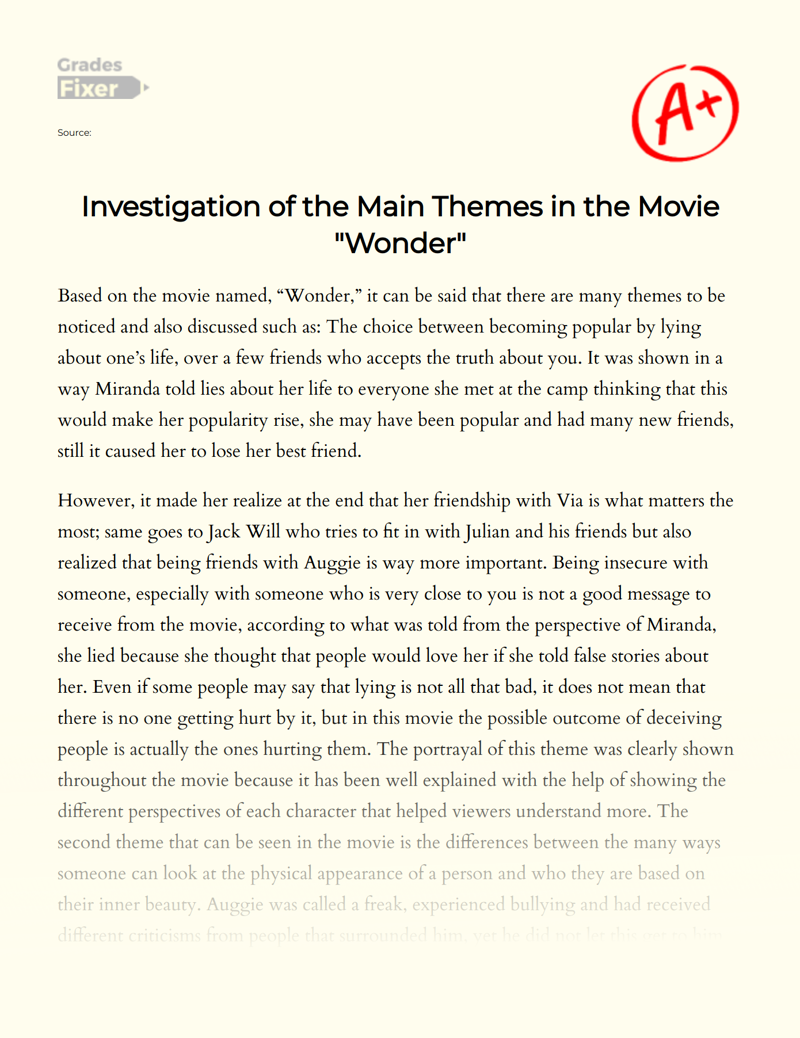
Still can’t find what you need?
Browse our vast selection of original essay samples, each expertly formatted and styled
Related Essays on Film Analysis
Watching a good movie is one of my favorite pastimes. After a long day of school or work there is on other sensations such as curling up on the couch and watching a great movie. Epic stories throughout our history our best [...]
The Matrix was a revolutionary movie that commented on technological reliance and used lighting, special effects and camera angles to add intrigue to the storyline. It tells of the dangers of technology and shows a worst-case [...]
The movie Little Miss Sunshine provides an amusing and honest portrayal of a typical American family. This Caucasian, middle-class family embarks on a disaster filled road trip, to take seven-year-old Olive from their home town [...]
The movie Coco is a film full of Mexican Culture and takes place during the Día de Muertos, Day of the Dead celebration. It’s directed by Lee Unkrich and released in 2017. The main character, Miguel Rivera loves music and [...]
The belief that “men and women should have equal rights and opportunities is pure feminist. This movement is based on the desire to become a better version, is more as a fight for freedom and to belong somewhere. A [...]
“We lived in farms, then we lived in cities, and now we’re gonna live on the internet” (Fincher & Rudin, 2010). The Social Network is a biographical drama that follows the life of Mark Zuckerberg and the events that led the [...]
Related Topics
By clicking “Send”, you agree to our Terms of service and Privacy statement . We will occasionally send you account related emails.
Where do you want us to send this sample?
By clicking “Continue”, you agree to our terms of service and privacy policy.
Be careful. This essay is not unique
This essay was donated by a student and is likely to have been used and submitted before
Download this Sample
Free samples may contain mistakes and not unique parts
Sorry, we could not paraphrase this essay. Our professional writers can rewrite it and get you a unique paper.
Please check your inbox.
We can write you a custom essay that will follow your exact instructions and meet the deadlines. Let's fix your grades together!
Get Your Personalized Essay in 3 Hours or Less!
We use cookies to personalyze your web-site experience. By continuing we’ll assume you board with our cookie policy .
- Instructions Followed To The Letter
- Deadlines Met At Every Stage
- Unique And Plagiarism Free

IMAGES
VIDEO
COMMENTS
But the film does so much so well for so long that its pat conclusion feels forgivable. Early on during a screening of "Wonder," when the film first reveals the scars and deformities that mark the hero's face, my eight-year-old son turned to me and whispered, "He looks weird.". Once the movie was over, as we were walking out of the ...
Synopsis. This paper will examine the family structure in the movie Wonder. The film narrates a story of a ten-year-old boy named August, or Auggie, Pullman, a child with a genetic disorder that causes him to have visible facial deformities. As he starts school for the first time, he struggles with making friends and bullying.
"Wonder" is an honest feel-good movie, but it lacks the pricklier edges of art. Auggie has been home-schooled by his mother, Isabel (Julia Roberts), in their cozy Brooklyn brownstone.
Rating: 3 out of 5. But Wonder doesn't focus exclusively on Auggie, and that's its biggest strength. The film's bigger story is that even though Auggie's family — his parents, his sister ...
Popular mythology notwithstanding, childhood is difficult for almost everyone. But especially so for 10-year-old August Pullman. "I know I'm not an ordinary kid," Auggie Pullman explains in ...
While "Wonder" is not a true story the film reveals some important truths. It is based on the 2012 novel of the same title as the movie, authored by R.J. Palacio, who was inspired to write ...
Wonder is a 2017 American coming-of-age family drama film directed by Stephen Chbosky, who co-wrote the screenplay with Steven Conrad and Jack Thorne.It is based on the 2012 novel of the same name by R. J. Palacio and stars Julia Roberts, Owen Wilson, Jacob Tremblay, Mandy Patinkin, and Daveed Diggs.. The film, which follows a boy named August Pullman or Auggie as his family calls him, with ...
December 21, 2017. Since its premiere last month, Wonder has been touted as a "feel-good," family-friendly movie for the holiday season. The film is based on the 2012 bestselling novel by R.J ...
It is refreshing to find a film that simply asks its audience to "choose kind." I became familiar with this phrase when reading the R.J. Palacio 's bestselling novel "Wonder." The recent movie,"Wonder," based on the book by the same name, tells the story of 10-year-old Auggie (Jacob Tremblay), a boy with facial deformities.. Homeschooled up until the fourth grade, Auggie is well ...
The movie 'Wonder' has strong messages about kindness, love, appreciating everyone for who they are and true friendship. 'Wonder' tells a story of a boy named August/ 'Auggie' (Jacob Tremblay ...
Kids say ( 200 ): Based on R.J. Palacio's hugely popular, award-winning novel, this drama is earnest and sweet, with great messages about kindness, friendship, and acceptance for its tween target audience. Whether they've read the book or not, kids are sure to appreciate Wonder 's take on how hard it can be to fit in and feel good about ...
Wonder Summary. August or "Auggie" Pullman, a ten-year-old boy living in New York City, was born with a facial deformity that has made it difficult for him to make friends. He lives with his parents, his older sister Via, and his dog Daisy. He has been homeschooled up until the fifth grade, but his parents have decided that it is time for him ...
Analysis, Pages 3 (588 words) Views. 1913. The movie Wonder tells the story of August Pullman, better known as Auggie, a ten year old boy who was born with a very rare genetic condition that reflects mostly in a deformity in his face. Auggie has spent his whole life sheltered by his parents and his sister at home, but with very little ...
8. The movie "Wonder" directed by Stephen Chbosky was released in theaters last November 17, 2017 starring Julia Roberts (Isabel Pullman), Owen Wilson (Nate Pullman), and Jacob Tremblay (August Pullman). It was originally a book written by R. J Palacio that made it possible for the movie to be created. In the movie, Auggie Pullman was a ...
Some disabilities might be visible, as highlighted in the new cinematic drama "Wonder.". It's based on the New York Times bestseller by Raquel J. Palacio about the first mainstream school ...
Wonder' Movie Review Essay. This essay sample was donated by a student to help the academic community. Papers provided by EduBirdie writers usually outdo students' samples. Movie and book comparisons are the most common thing people go to doing for a research paper. The movie and novel Wonder starts out with the main character August or Auggie ...
Lelio is less concerned about the practical truths and lies of "The Wonder" than he is about what they mean, what they say about humanity, and how they interrogate what we believe. Pugh plays Lib Wright, an English nurse in the year 1862, a year when the mass famine of the 1840s has left scars across the Irish landscape to which she travels.
So, I would like to introduce a movie called Wonder. This movie was rewritten by R. J. Palacio's fiction in 2012. According to the movie, the main character called "Auggie" who is a 10-year-old boy, living in North River Heights, New York, with his mother Isabel, father Nate, older sister Olivia, and dog Daisy.
Wonder Essay Questions. 1. In what way does this book embody the common message "Don't judge a book by its cover"? Throughout the novel, Auggie constantly fights to be known for something other than the way he looks. His face may appear strange and frightening, but on the inside he is no different from any other kid.
Good discussion is the heart of any English class, and Wonder by R.J. Palacio provides so much rich material for students to reflect on and discuss. The questions below can be used to initiate discussion in small groups, or as a whole class. Often it can be helpful to start with small groups, and then have them come together for a larger ...
The book and movie versions of Wonder share the same main plot and characters, but there are key differences. One primary difference is how Auggie's physical deformity is portrayed. The book is ...
Even better, its literal and figurative precepts carry an inspiring weight worthy to last many generations more. Directed by the good hands of Stephen Chbosky, Wonder is an instant classic, sure to become a new favorite, for its target audience and a winning (and rare) example of a film taking great care to do justice by the book it is based on.
Published: Apr 15, 2020. Based on the movie named, "Wonder," it can be said that there are many themes to be noticed and also discussed such as: The choice between becoming popular by lying about one's life, over a few friends who accepts the truth about you. It was shown in a way Miranda told lies about her life to everyone she met at ...